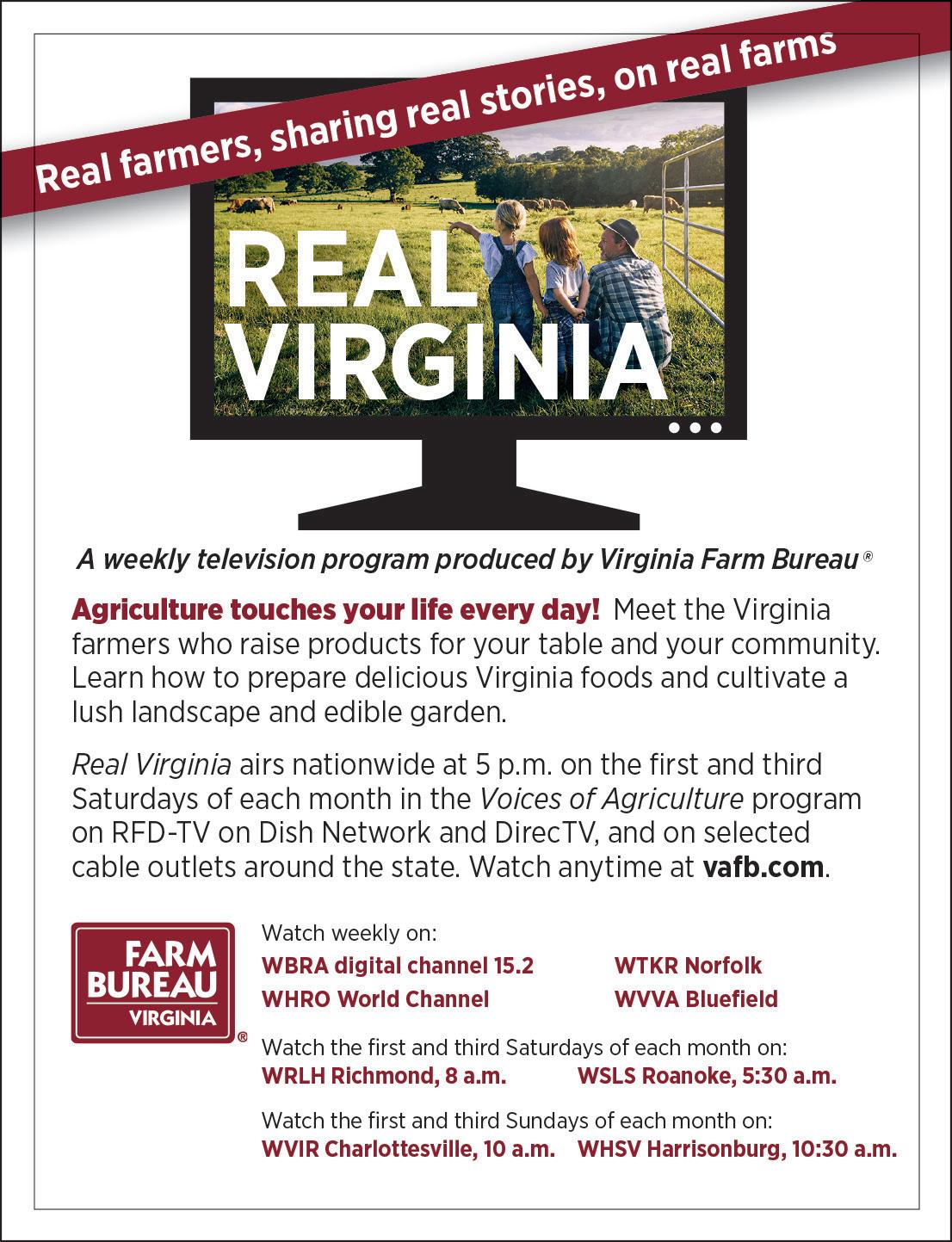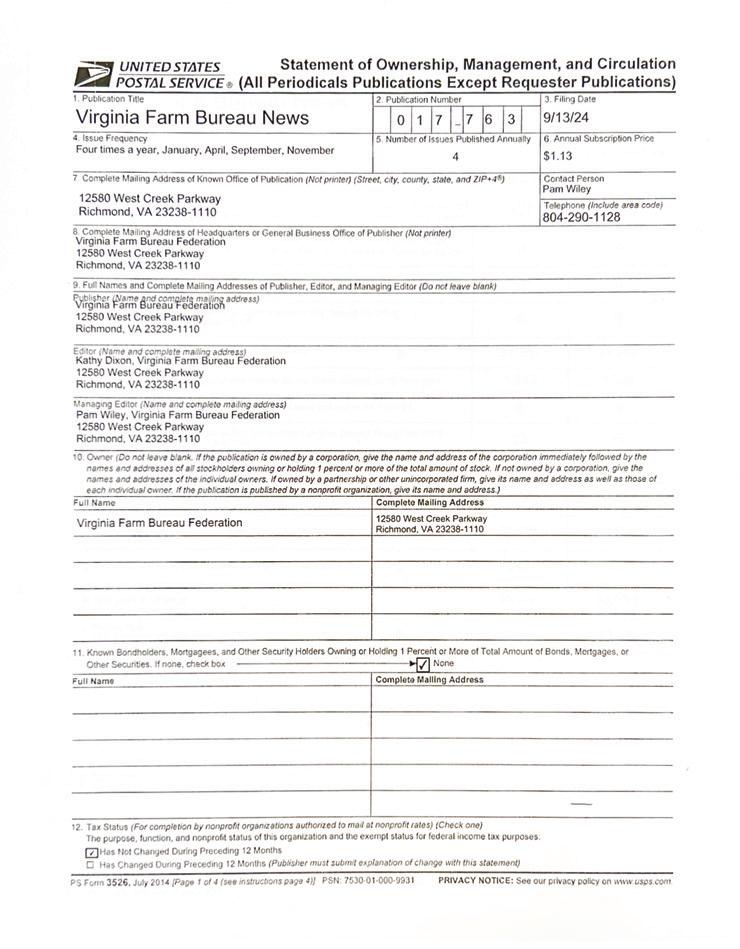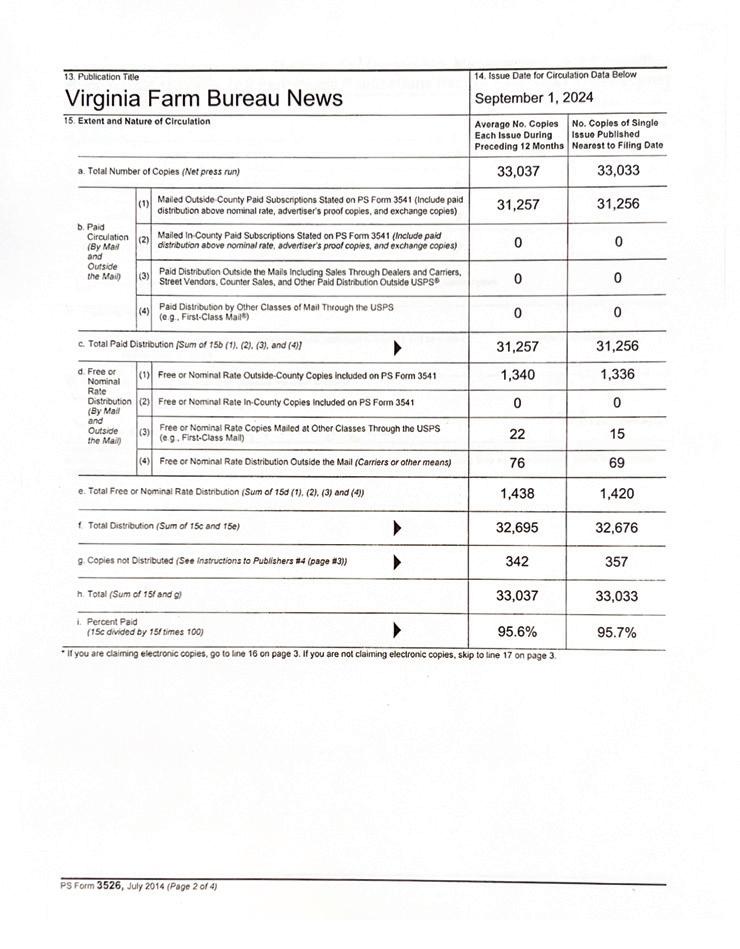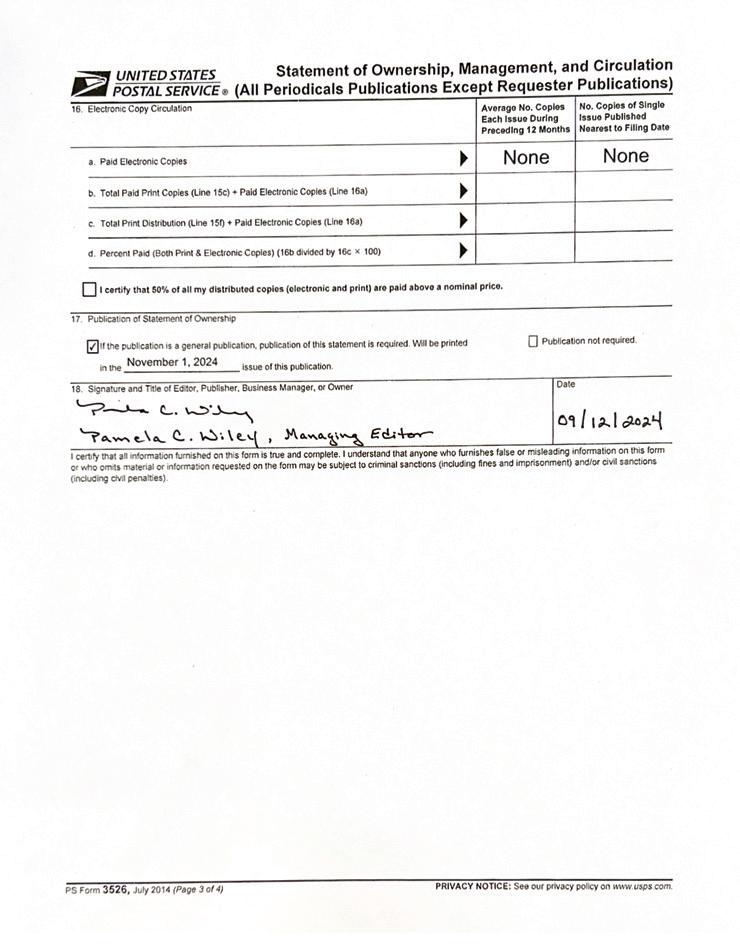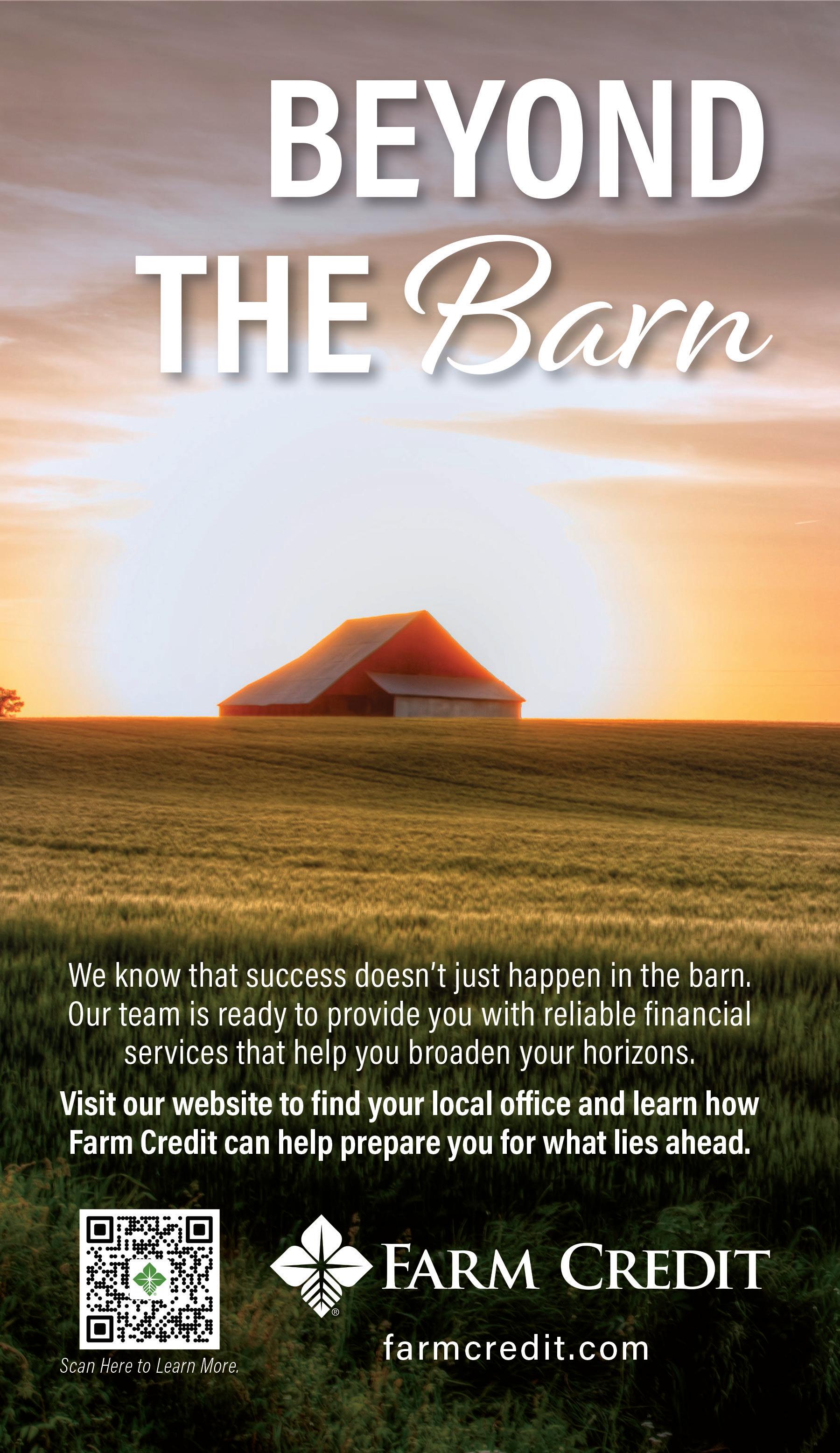











VFBF president credits many successes to others

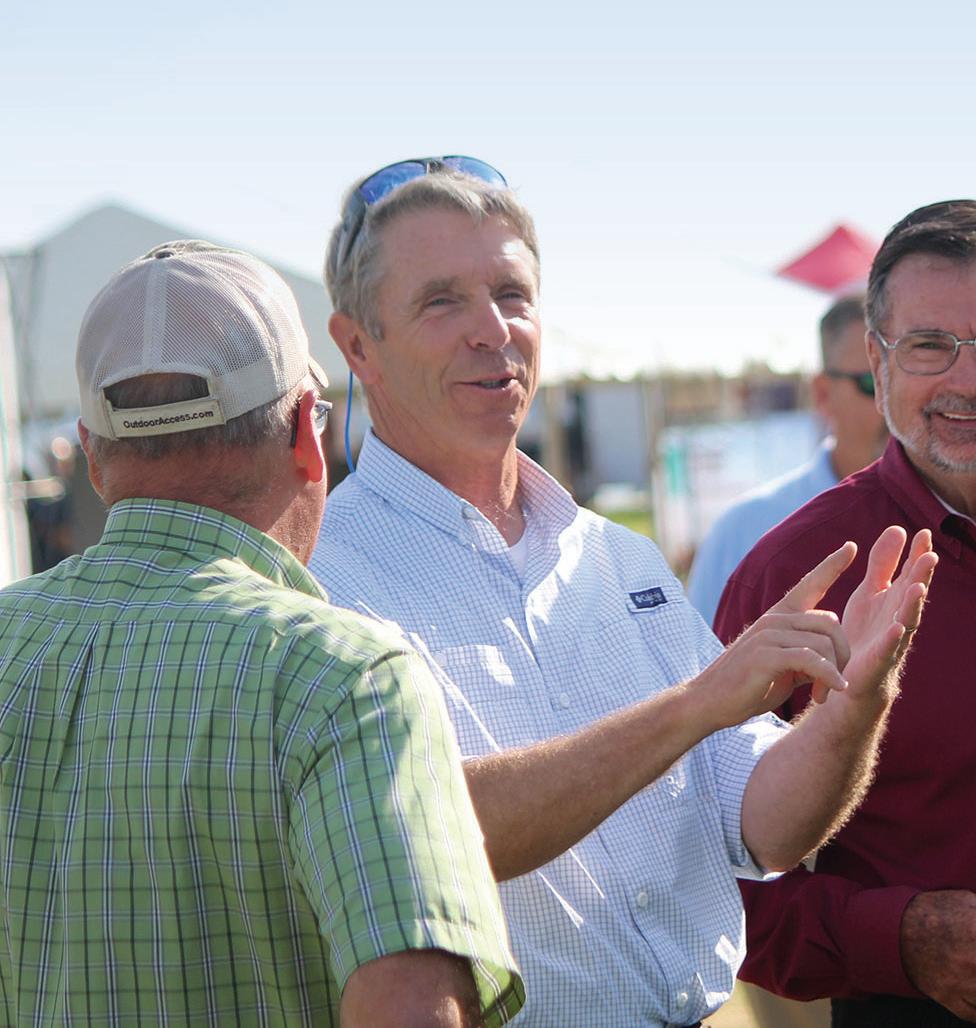



Farm Bureau News
Volume 83, Number 4
November 2024
Virginia Farm Bureau News (USPS 017763) (ISSN 1525-528X) is published four times a year. January, April, September, November. It is published by Virginia Farm Bureau Federation, 12580 West Creek Parkway, Richmond, VA 23238. Periodicals postage rate is paid at Richmond, VA and additional mailing offices. The annual Subscription Rate is $1.13 (included in membership dues).
Postmaster: Please send changes of address to, Virginia Farm Bureau Federation, Farm Bureau News, P.O. Box 27552, Richmond, VA 23261-7552; fax 804-290-1096. Editorial and business offices are located at 12580 West Creek Parkway, Richmond, VA 23238. Telephone 804-290-1000, fax 804-290-1096. Email virginiafarmbureaunews@vafb.com. Office hours are 8 a.m. to 4:30 p.m., Monday through Friday.
Members — Address change? If your address or phone number has changed, or is about to change, contact your county Farm Bureau. They will update your membership and subscription information.







The Silent Generation,
“That process of policy development is really who we are.”
— WAYNE F. PRYOR , President, Virginia Farm Bureau Federation
All advertising is accepted subject to the publisher’s approval. Advertisers must assume liability for the content of their advertising. The publisher assumes no liability for products or services advertised. The publisher maintains the right to cancel advertising for nonpayment or reader complaints about services or products.
Member: Virginia Press Association
EDITORIAL TEAM

Generation



Pam Wiley Vice President, Communications
Kathy Dixon Managing Editor
Nicole Zema Sr. Staff Writer/Photographer
Christina Amano Dolan Staff Writer/ Photographer
Kenny Kane Graphic Design Manager
Eleanor Stickley Sr. Graphic Designer

Virginia







Producer members will receive their next issue of Virginia Farm Bureau News in January. The magazine is published quarterly, and back issues can be viewed at issuu. com/virginiafarmbureau.
Alice Kemp Sr. Staff Writer/Advertising Coordinator
VIRGINIA FARM BUREAU FEDERATION Officers
Wayne F. Pryor, President
Scott E. Sink, Vice President
Board of Directors
DIRECTOR DISTRICT COUNTY
Emily F. Edmondson 1 Tazewell
Richard L. Sutherland 2 Grayson
Bruce N. Stanger 3 Montgomery
Jeannie L. Dudding 4 Craig
Russell L. Williams II 5 Rockbridge
Justin Pence 6 Shenandoah
Thomas E. Graves 7 Orange
Leigh H. Pemberton 8 Hanover
William F. Osl Jr. 9 Cumberland




Robert J. Mills Jr. 10 Pittsylvania
J. M. Jenkins Jr. 11 Lunenburg
J. Barry Bates 12 Essex
Gary D. Cross 13 Southampton
David L. Hickman 14 Accomack


A. Faye Hundley * Essex
Michelle Fox ** Tazewell
*Women’s Committee Chair **Young Farmers Committee Chair
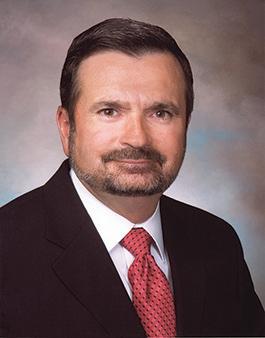
When Virginia Farm Bureau Federation bought The Meadow Event Park in 2013, the goal was to maintain the agricultural aspects of the State Fair of Virginia. Doing that would help us fulfill part of Farm Bureau’s mission of enhancing the agricultural interests of our members. By owning the 331-acre rural property that is the birthplace of Secretariat, we’ve had a say in all the activities that occur on this valuable, historic land in Caroline County.
There have been a plethora of activities that have helped educate the public about agriculture, as well as support the surrounding community. We just didn’t realize how much effect that property has had until the results of a recent economic impact study conducted by Chmura Economics & Analytics.
The company found that The Meadow Event Park and its events had an overall economic impact of $41.5 million and supported 288 jobs in 2023. The study analyzed the impact not just in Caroline, but also in Hanover and Henrico counties and the city of Richmond.
Last year, the property hosted over 536,000 visitors at 182 diverse events. Events held in 2023 included dog, livestock and equine shows and sold-out rodeos; trade shows; concerts; and weddings and corporate functions. It also hosted community happenings, including Hanover County High School’s graduation and Caroline’s Promise Young Entrepreneur Expo, which allows youth ages 5-18 to launch a new business or showcase handmade goods. Additionally, The Meadow regularly serves as a pickup location for clients of the Fredericksburg Regional Food Bank.
Major events besides the fair included the 10th annual Illuminate Light Show; the 19-date After Hours Concert Series; and the 50th Annual BMW Motorcycle Owners of America National Rally.
The vast majority of The Meadow’s visitors—93%—were day-trippers who spent an average of $91.20 per trip, and collectively spent $48.9 million during their visits in 2023.
The venue’s operations generated direct, indirect and induced economic impact of $10.2 million in the region and supported 42 jobs. It also was found to have generated $1.1 million in tax and fee revenue in Caroline County.
Spending in the area by vendors participating in events on the property generated an estimated impact of $14 million, which supported 96 jobs.
I know that Marlene Jolliffe, vice president of operations for The Meadow and executive director of the State Fair, and her staff have worked hard over the past decade to grow business at The Meadow. While doing so, they’ve also increased its financial and philanthropic impact in the community.
Caroline County Board of Supervisors chair Jeff Black recognized that The Meadow and the State Fair are a huge asset to the county. He praised the venue’s support of local jobs and providing tax revenue for the community, as well as participating in multiple charitable causes in the region.
I am proud of The Meadow’s success. I hope all of you, our members, recognize the property’s value as it hosts many kinds of events while also supporting local communities.
Wayne F. Pryor, a Goochland County hay and grain producer, is president of Virginia Farm Bureau Federation.
as of October 15*
year ended Oct. 31, 2024.



Groundwater flows and eventually becomes surface water such as a creek, pond, or lake. Or it may be extracted for irrigation, drinking water, or other purposes. It’s an important resource now and for future generations, and it’s important to protect it.
It doesn’t take much petroleum to contaminate millions of gallons of groundwater. Buried petroleum storage tanks, if they are constructed of metal, are likely to develop holes after about 30 years or so, simply by natural corrosion of the metal. Resulting leakage may pose a significant risk to groundwater quality and possibly human health. We at Pollard Environmental know this because we see it every day.
Virginia has an excellent financial assistance program to help remedy the problem. That’s where Pollard comes in. We inspect your tank, and if there is leakage, we secure financial assistance from the state to evaluate the risk and clean it up if necessary. It really is an excellent program, and we make it simple because we handle all of the paperwork.

Featured this month on Real Virginia, Virginia Farm Bureau’s weekly television program:
• Find out how Farm Bureau members are helping other farmers who lost valuable hay and other supplies as a result of Hurricane Helene.
• Learn about fresh American chestnuts that can be picked right here in Virginia.
• Discover Pulaski County agriculture in the latest County Close-up feature.
Real Virginia airs nationwide at 5 p.m. on the first and third Saturdays of each month in the Voices of Agriculture program on RFD-TV on Dish Network and DirecTV; and on selected cable outlets around the state. It airs weekly on WBRA digital channel 15.2, the WHRO World Channel, WVVA Bluefield and WTKR Norfolk, and on the first and third Sundays of each month at 10 a.m. on WVIR Charlottesville and at 10:30 a.m. on WHSV Harrisonburg; and on the first and third Saturdays at 8 a.m. on WRLH Richmond and at 5:30 a.m. on WSLS Roanoke.

160,000
That’s how many members are in Virginia 4-H, an organization with 5,500 adult volunteers and a goal to cultivate leadership skills and encourage community engagement among the state’s youth. See related article on page 18.

“Cultivating Connections” is the theme of the 2024 Virginia Farm Bureau® Federation Annual Convention and Meeting of Voting Delegates. The event will begin the afternoon of Dec. 2 with registration at The Omni Homestead Resort in Hot Springs and will conclude on the morning of Dec. 5.
Known for its Southern hospitality and charm, the newly renovated Homestead has served as an elegant retreat for 23 U.S. presidents and several foreign dignitaries throughout its rich 250-year history. Nestled in the scenic Alleghany Mountains, the resort boasts a variety of indoor and outdoor recreational activities, including historical tours, horseback riding, hiking, games, wine tastings and more. Convention attendees can take a rejuvenating dip in the warm, natural mineral waters of the famous Jefferson Pools, relax at the resort spa, or pick up holiday gifts at the shops located next to The Great Hall.
The convention will feature “Future of Farm Bureau Candidate Forums” on Monday, Dec. 2, at 7 p.m. Candidates interested in running for the office of VFBF president or vice president

will share their visions for leadership, growth and how they will address key challenges. Voting delegates will have an opportunity to ask questions.
Additionally, American Farm Bureau Federation President Zippy Duvall will give welcome remarks during the Farm to Table Luncheon on Dec. 3.
Duvall is a third-generation farmer from Georgia and has served as AFBF president since 2016. He helped shape the 2018 Farm Bill and is working to ensure the next farm bill effectively supports farmers and ranchers. He is a National 4-H founding luminary and a past Georgia Farm Bureau president and AFBF Young Farmers & Ranchers Committee chair. He and his son operate a beef cow herd, raise broiler chickens and grow hay while restoring their 90-year-old family farm.
The convention also will feature Lisa Smartt, humorist and motivational speaker, during the Fellowship Luncheon on Wednesday, Dec. 4. An author and columnist, Smartt loves sharing her personal weaknesses, struggles and joys of daily living with others.
On Dec. 4, delegates certified from each county Farm Bureau will establish VFBF state and federal policies for the coming year, and vote for president, vice president, Women’s Leadership Committee chair, Young Farmers Committee chair and directors representing Districts 2, 5, 8, 11 and 14.
Additionally, judging will take place for the Young Farmers Discussion Meet and the Virginia Foundation for Agriculture, Innovation and Rural Sustainability’s Agricultural and Forestry Innovation “Bull Pen” Challenge. Winners will be announced during the convention.
Convention events will include presentations of the 2024 VFBF County Farm Bureau Awards of Excellence and the 2024 VFBF Journalism Awards.
The event also will host silent and live auctions benefiting Virginia Agriculture in the Classroom; an ice cream social; and opportunities to mingle and make connections with fellow Farm Bureau members.
A statewide peanut butter and jelly drive has been going on since July, and as of press time had collected 3,067 pounds of food and $320 in cash donations.
“That's a lot of PB&J sandwiches!” exclaimed Christy Murphy, Virginia Farm Bureau Federation women’s leadership coordinator.
She said more than 22 county Farm Bureau women’s committees participated in the collection this past summer and fall. Donations also were gathered by county Farm Bureau offices, members and Farm Bureau employees.
The PB&J drive was sponsored by the VFBF Women’s Leadership Committee to help communities address food insecurity. Peanut butter is one of the most needed items among food banks across Virginia.
The donations will be distributed through the Federation of Virginia Food Banks’ multiple regional and local pantries, and were donated to summer school programs as well.
“The generosity of our members has assisted many families in need throughout Virginia,” Murphy noted. “We are thankful for all the donations.”
The Virginia-type peanut, grown primarily in Virginia and the Carolinas, is known for its extra-large size, distinct nutty flavor, and characteristic crunch. Virginia has more than 200 growers who produce peanuts on over 28,000 acres annually.
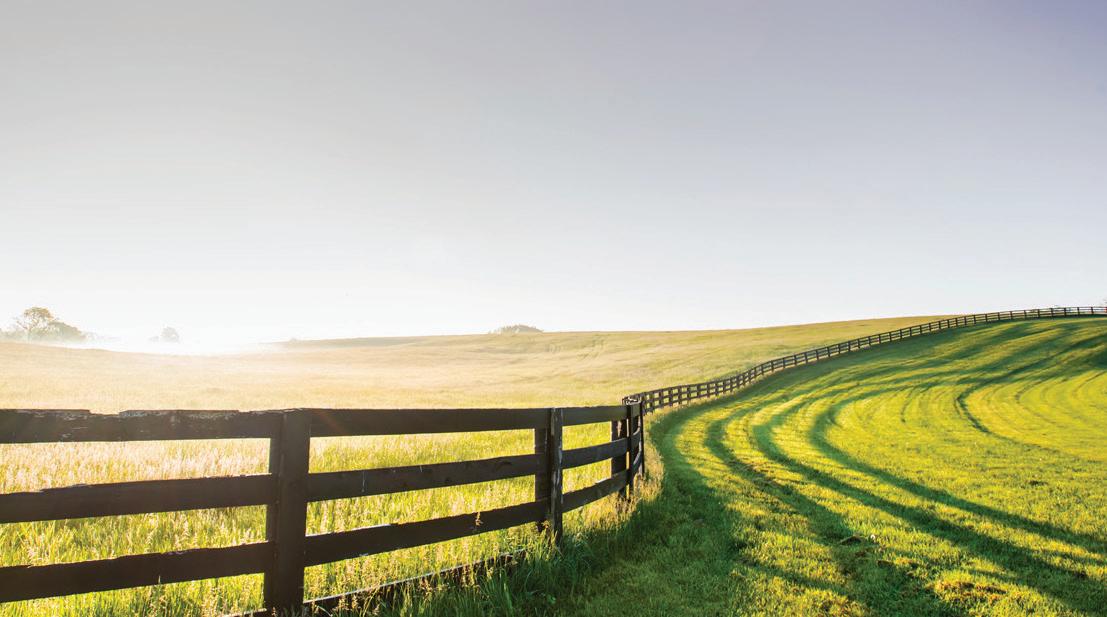


Bureau Members receive $500* toward an eligible new F-150® Lightning®, Super Duty®, F-150, Ranger® or Maverick® .
FordRecognizesU.com/FarmBureau today for complete offer details!




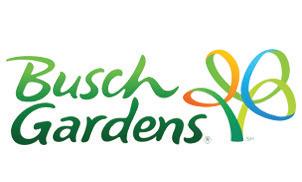






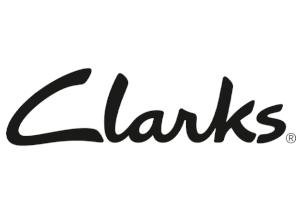



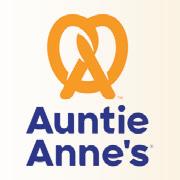

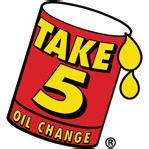



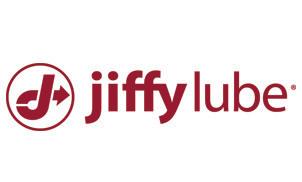




Affinity Cellular operates on the nation’s largest and most dependable network, and has been providing service to membership organizations since 2011.
Affinity Cellular offers a wide array of plans and phones with a focus on talk and text only, with lower data consumption. You select the phone and plan that best fit your needs!
Virginia Farm Bureau members enjoy exclusive benefits, including a $75 airtime credit, free activation ($35 value) and free shipping. Members have the option to keep their current phones (subject to network compatibility), select from the latest iPhone or Android devices, or choose a simple flip phone. They also may keep their existing cell phone numbers.
To set up a plan with Affinity Cellular, visit vafb.com/benefits, log in as a Virginia Farm Bureau member, and go to the Affinity Cellular tab. Use the dedicated website link or phone number provided.
* Under Affinity Cellular’s Fair Use Policy, the company has established usage thresholds of 5,000 minutes for voice and 5,000 texts. On our Unlimited Data Plan, the fair use threshold is 35GB of data. If this amount is exceeded, it will result in throttling of data. Usage that exceeds the monthly usage will be considered a violation of this Fair Use Policy and subject to overage charges.”
Virginia Farm Bureau members receive a 15% discount off best available rates at Drury Hotels, where extras aren't extra.
The discount is valid at more than 150 Drury Hotels locations in 26 states, including one in Richmond. See a full list of locations at druryhotels.com/locations.
All overnight guests will enjoy free hot breakfast; free 5:30-7 p.m. appetizers and cold beverages; free internet access; and free stays for kids in their parents’ room.
To make a reservation, visit vafb.com/benefits, log into your account, and go to the Drury Hotels tab. The corporate code should populate automatically.
* Discount subject to availability and cannot be used with other discounts, offers or promotions. Discounts cannot be used with other programs. Advance reservations are required, and blackout dates apply!
Since 1908, KEY Apparel has crafted quality workwear at an affordable price. KEY Apparel provides comfortable office wear and rugged workwear, all shipped from its headquarters in Fort Scott, Kansas. Virginia Farm Bureau has partnered with KEY to provide members with apparel they can rely on.
Virginia Farm Bureau members will receive a 10%-20% discount on all merchandise, plus free shipping on orders over $75. Members can customize garments with state or county Farm Bureau logos, or add personal graphics like sports team and organizational logos.
To use this Virginia Farm Bureau benefit, visit vafb.com/ benefits, log in as a Virginia Farm Bureau member, and go to the KEY Apparel tab and follow the link to Virginia’s exclusive site.
Great Hearing Benefits works to improve hearing health, which is essential to overall health. The company is comprised of thousands of credentialed hearing care professionals in a nationwide network, providing the latest technology with affordable pricing, award-winning care and record-breaking patient satisfaction.
And now, Virginia Farm Bureau members can save up to 50% on top hearing aids provided through companies like Beltone, ReSound and Jabra.
Members get:
• Discounted pricing in today’s top hearing technology;
• A free 60-day trial;
• 3-year warranty and service;
• 5,000+ hearing care locations nationwide;
• In-person or virtual appointments;
• The benefit of sharing discounts with up to three immediate family members; and
• A 25% discount off Jabra consumer audio and headsets, plus office teleconference products.
To access your savings, visit vafb.com/benefits, log in as a Virginia Farm Bureau member, and go to the Great Hearing Benefits tab to start saving.


BY CHRISTINA AMANO DOLAN
The holidays are upon us—signaling the end of another busy year and a return to the moments we hold most dear.
Gratitude enriches the season of giving as families reunite for much-needed respite and reflection. Bidding farewell to yesterday’s hustle and bustle, many embark on a new mission: Finding the perfect way to say, “You’re special.”
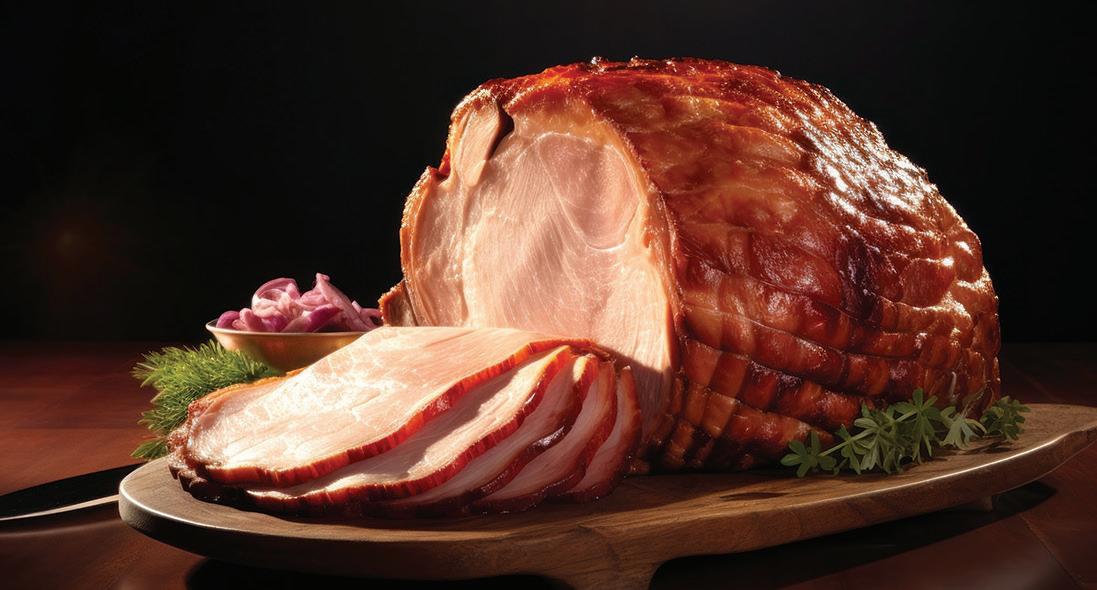
Gift your farmer something fun to look forward to when you purchase tickets to Dollywood Theme Park in Pigeon Forge, Tennessee.
Recognized as one of the world’s best theme parks, Dollywood boasts over 40 rides and attractions, including the world’s fastest wood coaster and the country’s first wing coaster.
Farm Bureau members can save $10 on regular or children’s tickets to Dollywood by logging into their membership account at vafb.com.
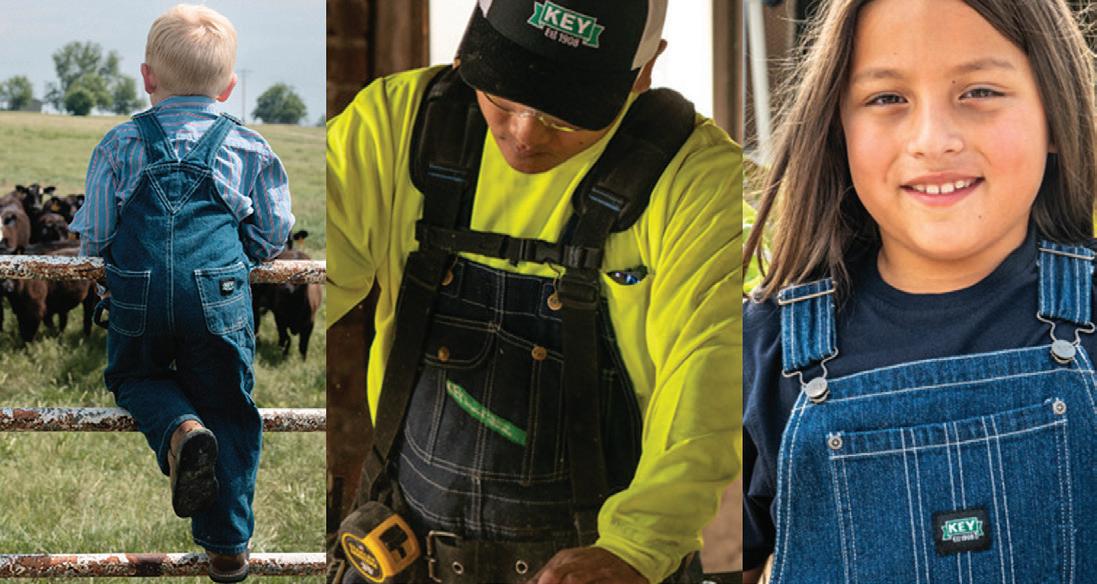
Selecting the right gift to show appreciation for a loved one can be a challenging endeavor— especially when it’s for someone who gives back year-round.
When contemplating ways to celebrate the farmer in your life, consider these unique gift options with exclusive savings for Virginia Farm Bureau members.
Gift your farmer gourmet treats that taste like home when you order Virginia’s Harvest products before Dec. 31.
Members can choose from a variety of home-grown delights, including butter-toasted peanuts, chocolate peanuts, peanut brittle and peanut squares. Also available are Virginia country hams—perfect for a holiday feast.
Place your order by calling 800-476-8473. VISA, MasterCard and Discover Card payments are accepted. You also can order the Virginia's Harvest gifts on the products division website at products.vafb.com.
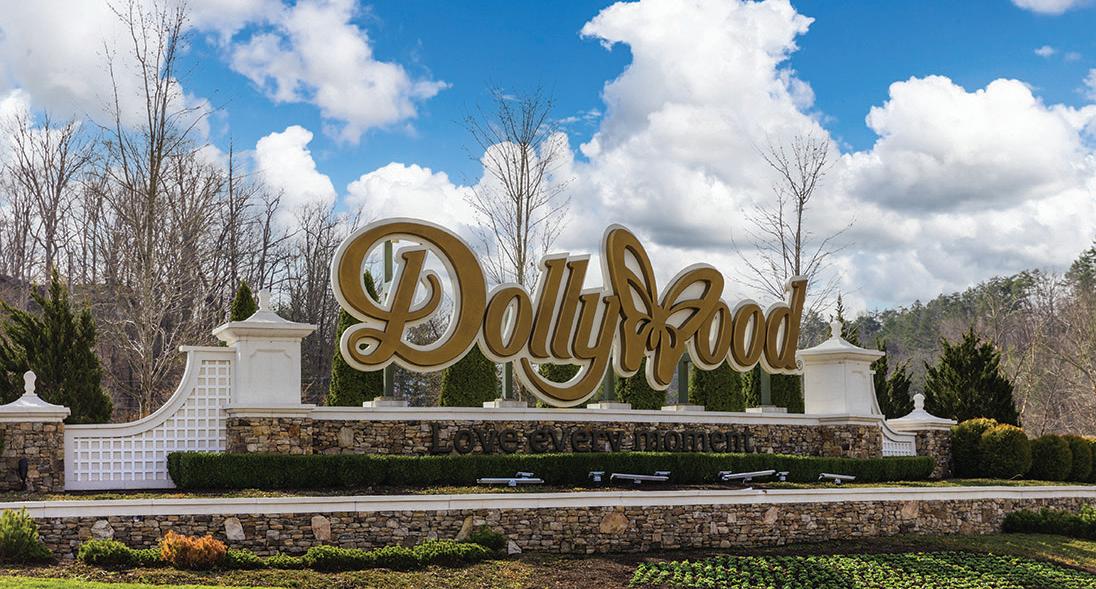
Freshen up your farmer’s wardrobe with rugged, customized workwear they can rely on.
Members can receive a 10%-20% discount on all KEY Apparel merchandise, plus free shipping on orders over $75.
Personalize workwear with state or county Farm Bureau logos, family farm names and logos, sports team graphics, or other unique emblems.
Visit vafb.com/Membership-at-Work/Benefits/Key-Apparel to start saving today.


Supply your farmer with needed items for the workdays ahead by exploring Grainger’s vast inventory of discounted products, including hand tools, motors, electrical equipment and more.
Members receive discounts on critical equipment and supplies and free standard ground shipping when ordering items online, over the phone or at their local Grainger dealer.
Gifting something for everyday use—like a beverage dispenser for keeping your farmer hydrated in the heat—is a simple way to show your appreciation.
Call 800-472-4643 to learn how to access exclusive Grainger member benefits and savings.
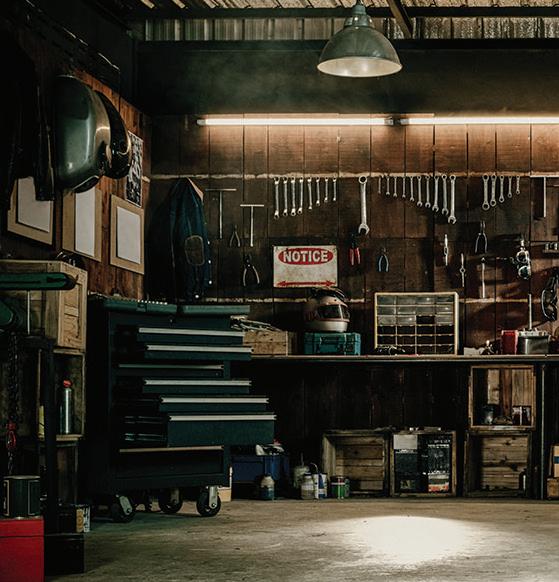



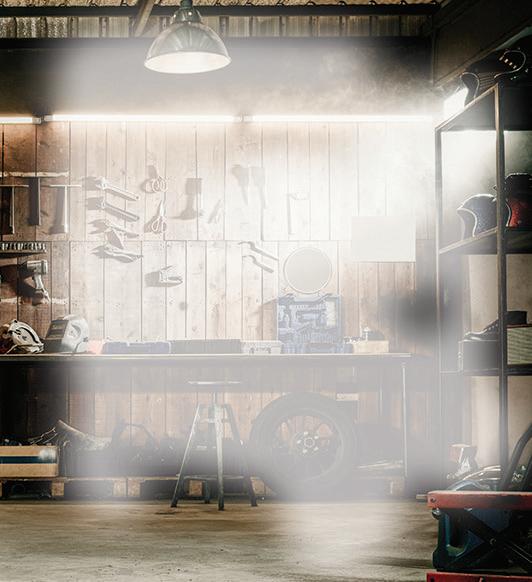
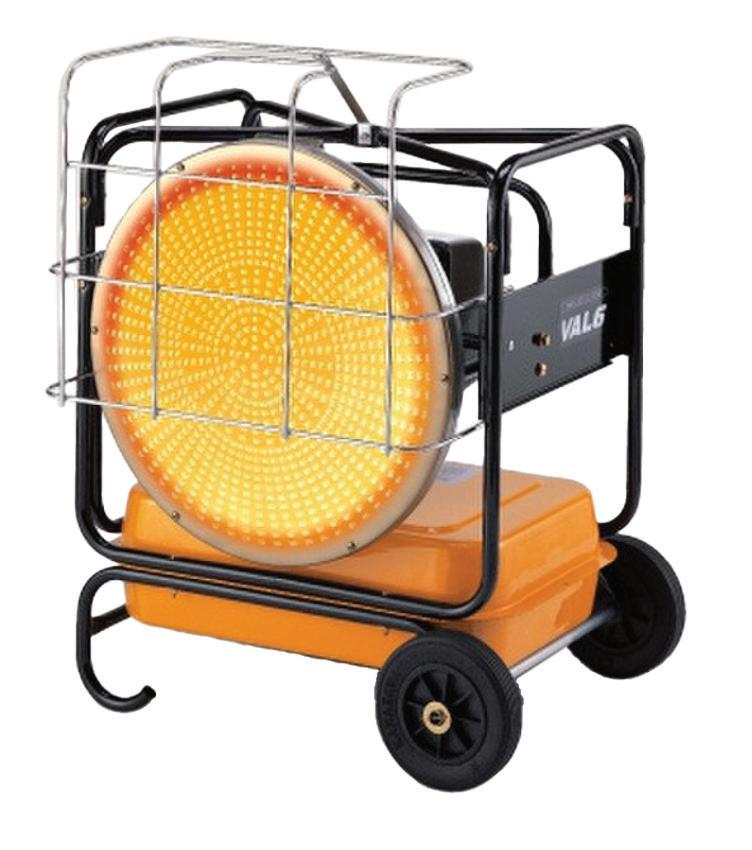

Prepare your farmer for tomorrow’s successes with the right vehicle to get them there.
Members can receive $500 toward the purchase or lease of a new Ford Maverick, Ranger, F-150 or Super Duty®.
Visit Ford’s Farm Bureau member website at fordrecognizesu.com/FarmBureau and use your membership number and ZIP code to generate a certificate that you can present to your local dealer. You must be a VFB member for at least 30 days to qualify.
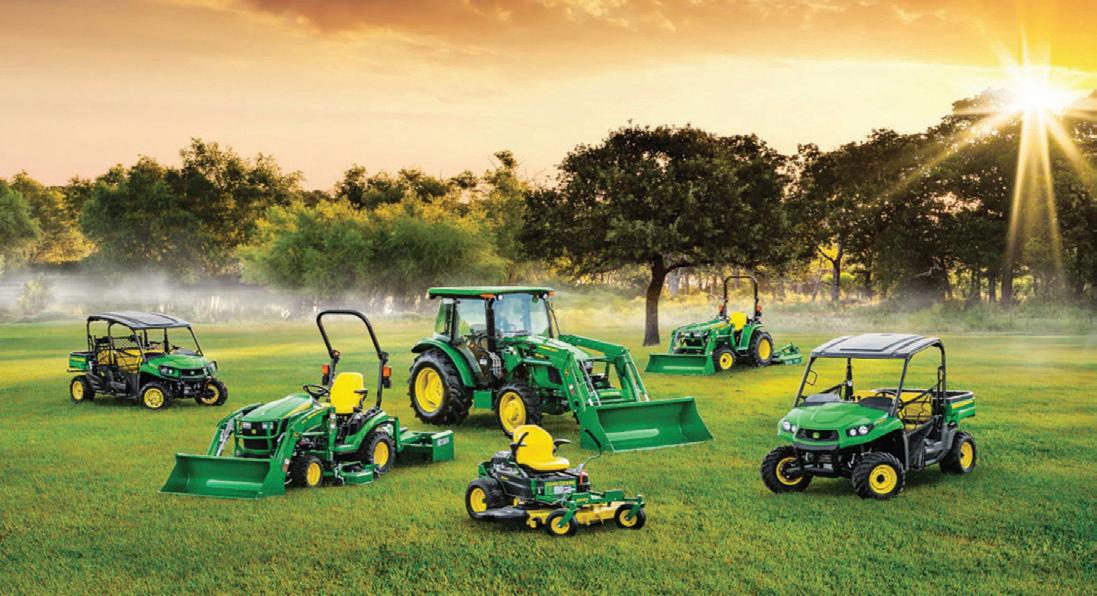

From tire sealants to tillage parts, the VFB Products Division website is a one-stop-shop for a variety of farming needs. Members can access discounts on top-quality tires, batteries, oil and grease, hardware, tillage, work apparel and more by placing an order for shipment through products.vafb.com
If you’re looking to give your farmer comfort for the cold, winter months, consider adding a VAL6 KBE5S Radiant Heater to your cart—ideal for heating workshops, garages and other work areas.


Gift your farmer fresh John Deere equipment for tackling next year’s to-do list—like a full-size XUV for powering through any job. Members can sign up to receive an automatic John Deere Rewards membership upgrade to Platinum 1—unlocking exclusive savings on select agriculture and turf equipment. They also will receive monthly offers for discounts on parts and merchandise. You must be a VFB member for at least 30 days to qualify. Special eligibility requirements may apply, including a waiting period or model and vehicle limitations.
Visit JohnDeere.com/FarmBureau to register.
BY CHRISTINA AMANO DOLAN
Some of Virginia’s strongest agricultural advocates will compete for national recognition at the 2025 American Farm Bureau Annual Convention, to be held Jan. 24-29 in San Antonio, Texas.
During the AFBF convention, Virginia Farm Bureau Federation Young Farmers will vie for honors in the AFBF Young Farmers & Ranchers Achievement Award and Excellence in Agriculture Award programs and the AFBF Discussion Meet competition.
Virginia finalists for the AFBF Achievement and Excellence in Agriculture awards were determined during the 2024 VFBF Young Farmers Summer Expo in July.
Morgan Slaven of Augusta County is Virginia’s competitor for the AFBF Excellence in Agriculture Award. The award recognizes involvement in agriculture, leadership ability and participation in Farm Bureau and other organizations.
Slaven serves as manager of governance and executive affairs for Shenandoah Valley Electric Cooperative while managing a 40-head commercial hair sheep flock on her Augusta farm.
She also represents District 5 on the VFBF Young Farmers Committee and serves as the committee’s vice chair and chair of the promotions subcommittee; chair of her county Farm Bureau’s Young Farmers committee; and vice president of her county Farm Bureau board.
Additionally, she serves on Farm Credit of the Virginias’ Young, Beginning & Small Farmer Advisory Committee and the Augusta County Agricultural Appreciation Gala Grassroots Committee, and she recently was appointed by the governor to serve as a board member for the Virginia Land Conservation Foundation.
Bradley Ragsdale of Pittsylvania County will compete for the AFBF Achievement Award, which
A new U.S. Department of Agriculture Animal & Plant Health Inspection Service rule for animal disease traceability regarding identification required for transporting cattle across state lines goes into effect Nov. 5.
This new rule covers the same classes of cattle that have been required to have some type of visual identification since 2013. This includes breeding cattle that are sexually intact; cows over 18 months of age; all female dairy cattle of any age; male dairy cattle born after March 11, 2013; and all cattle used for rodeo, recreational events, shows or exhibitions.
The former “official identification” included metal ear tags, RFID tags, tattoos and, in some cases, brands. The new 2024 rule requires that the “official identification” be both visually and electronically readable. The only approved electronic ID will be an 840-RFID tag. Cattlemen can order the 840-RFID tags at no cost by contacting Richard Odom with the Virginia Department of Agriculture and Consumer Services Office of Veterinary Services at 804-692-0600 or richard.odom@vdacs.virginia.gov
This rule does not apply to feeder cattle, cattle of any age going directly to slaughter, or cattle being transported within the state and not crossing state lines. For example, if you sold bred heifers into another state or purchased bred heifers from another state, those heifers would have required some type of visual permanent identification. The change this year will require that the identification be visually and electronically readable, which will be the 840-RFID tag.
For detailed information and FAQs regarding the new rule, scan this QR code:
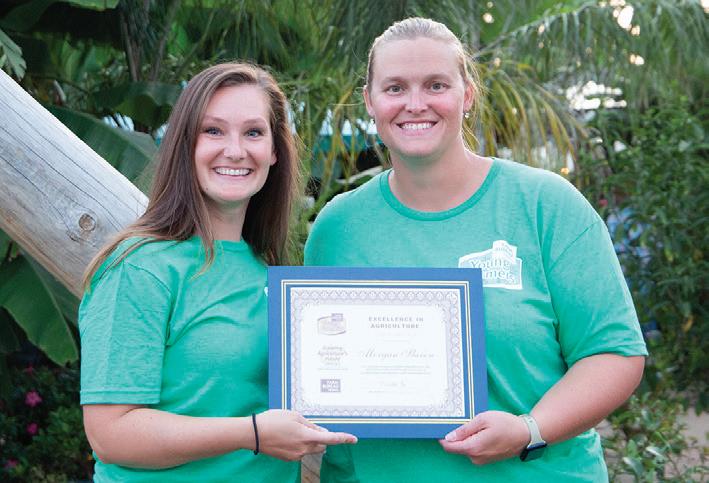
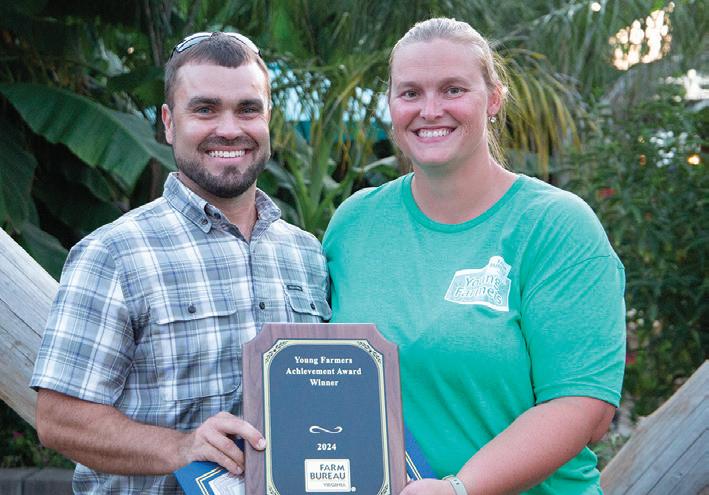
recognizes young Farm Bureau members for their efforts and leadership in production agriculture.
Ragsdale is a fourth-generation tobacco, grain and beef cattle farmer. He also serves on the Pittsylvania County Farm Bureau board and is an active member of the VFBF Young Farmers Program.
During his presentation to award judges, Ragsdale shared how he has helped grow his family’s 1,000-acre operation since joining the farm full-time in 2009. His successes have included acquiring an additional 90 acres of cropland in 2015 and building a greenhouse for custom-growing tobacco transplants.
The Virginia contestant for the AFBF Discussion Meet will be determined Dec. 3 during the 2024 VFBF Annual Convention.
The simulated committee meeting scores participants on their active participation, understanding of agriculture issues and ability to build consensus on predetermined topics.

This year’s VFBF Discussion Meet finalists are Thomas French and Ashley Kuhler of Shenandoah County, Adam Davis of Halifax County and Marshall Slaven of Augusta County.
At press time, AFBF YF&R contest prizes and sponsors were still being finalized.
BY NICOLE ZEMA
Wayne F. Pryor’s legacy of faithful stewardship has expanded the footprint and influence of Virginia Farm Bureau Federation and its family of companies, though he won’t take the credit.
As he transitions to retirement after nine terms as president and CEO, Pryor is looking back on a long list of achievements, expressing gratitude to everyone who shared his vision.
“Accomplishments over the past 18 years are not because of me,” he said. “They are thanks to our state board, county leaders, our employees and our overall membership believing and supporting our mission. Because of them, I’m very proud of what’s been accomplished. It’s been a lot.”
Pryor will take credit for one thing— appointing capable leaders. He created a new employment structure that reintroduced department directors as vice presidents.
“I’m especially proud of the people I’ve hired running all these departments,” he said. “That’s been my success, leaving these people in charge. We know employees are our greatest asset and always have been. We’d be nothing without them.”
Darlene Wells, retired executive vice president of Virginia Farm Bureau Mutual Insurance Co., said she’d never forget the day Pryor tapped her for that job, while the board worked through challenging times.
“He demonstrated significant confidence in me,” she said. “And I am eternally grateful for that. His passion for agriculture, serving the members of Farm Bureau, and supporting the success of the affiliated companies will be a long-lasting legacy.”
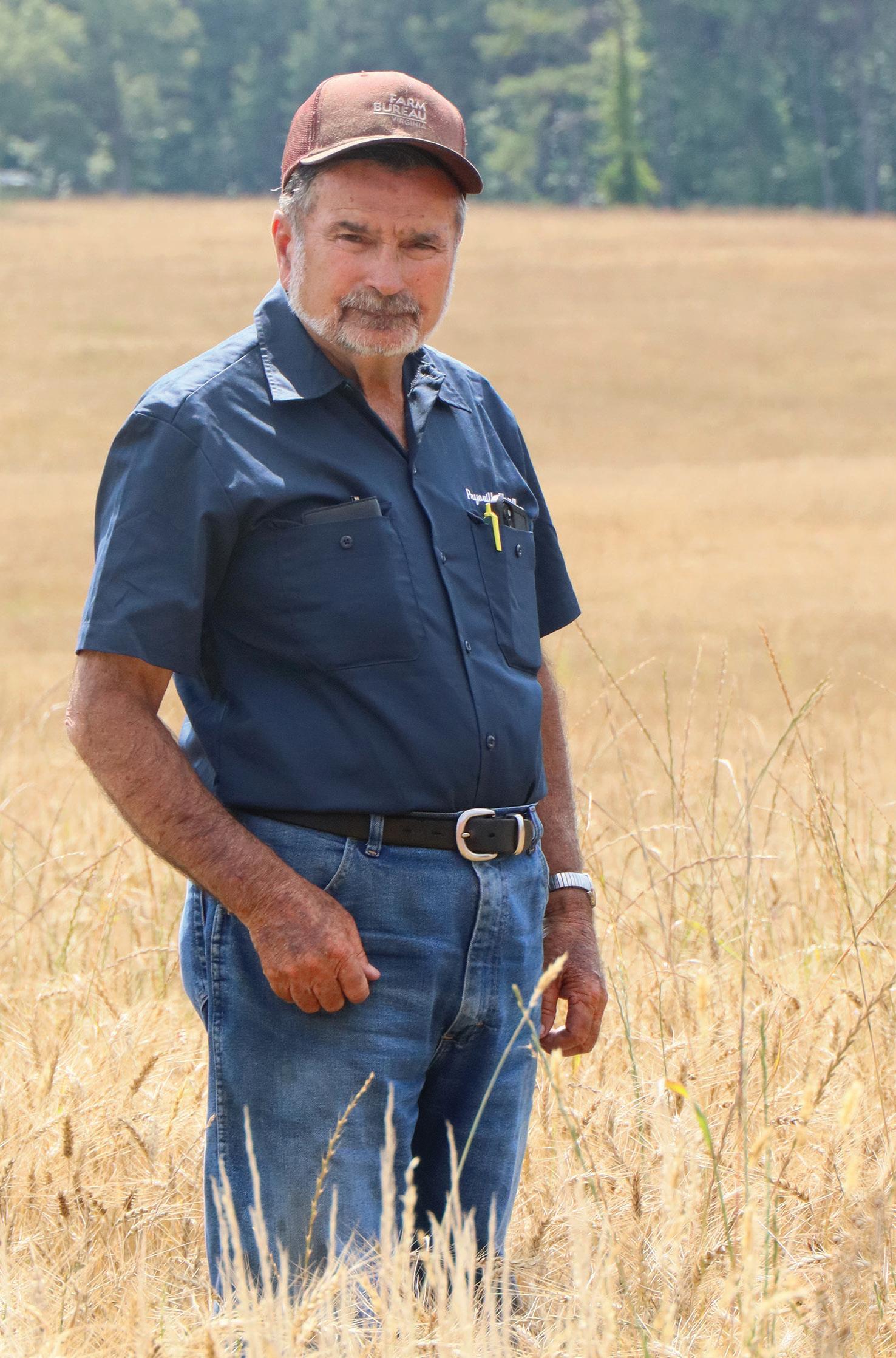
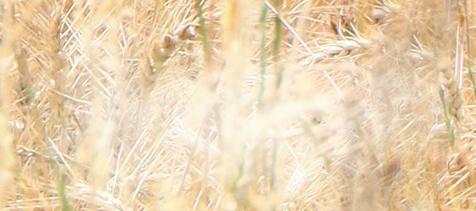

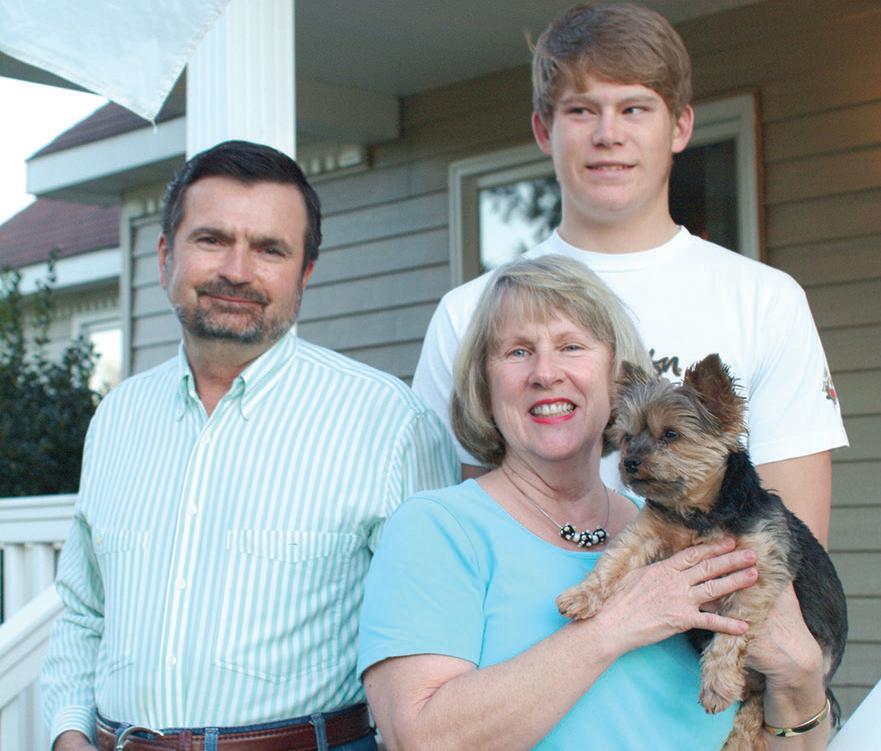
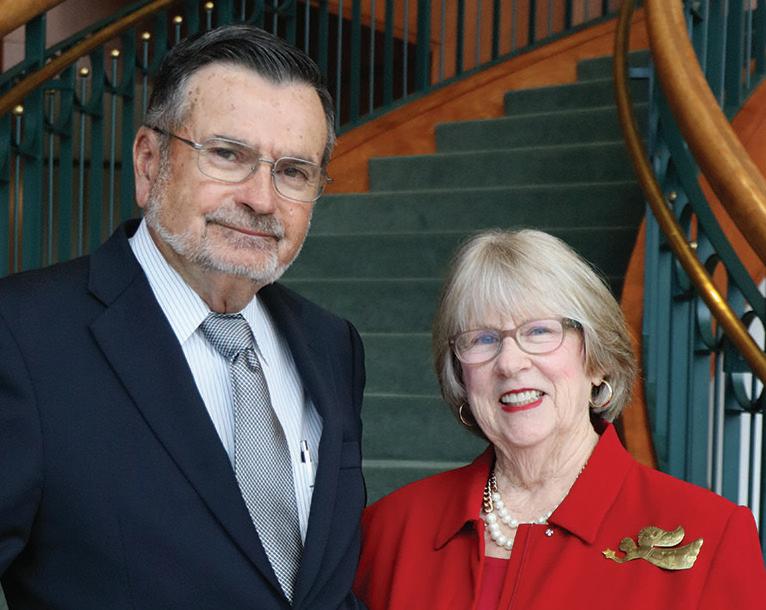
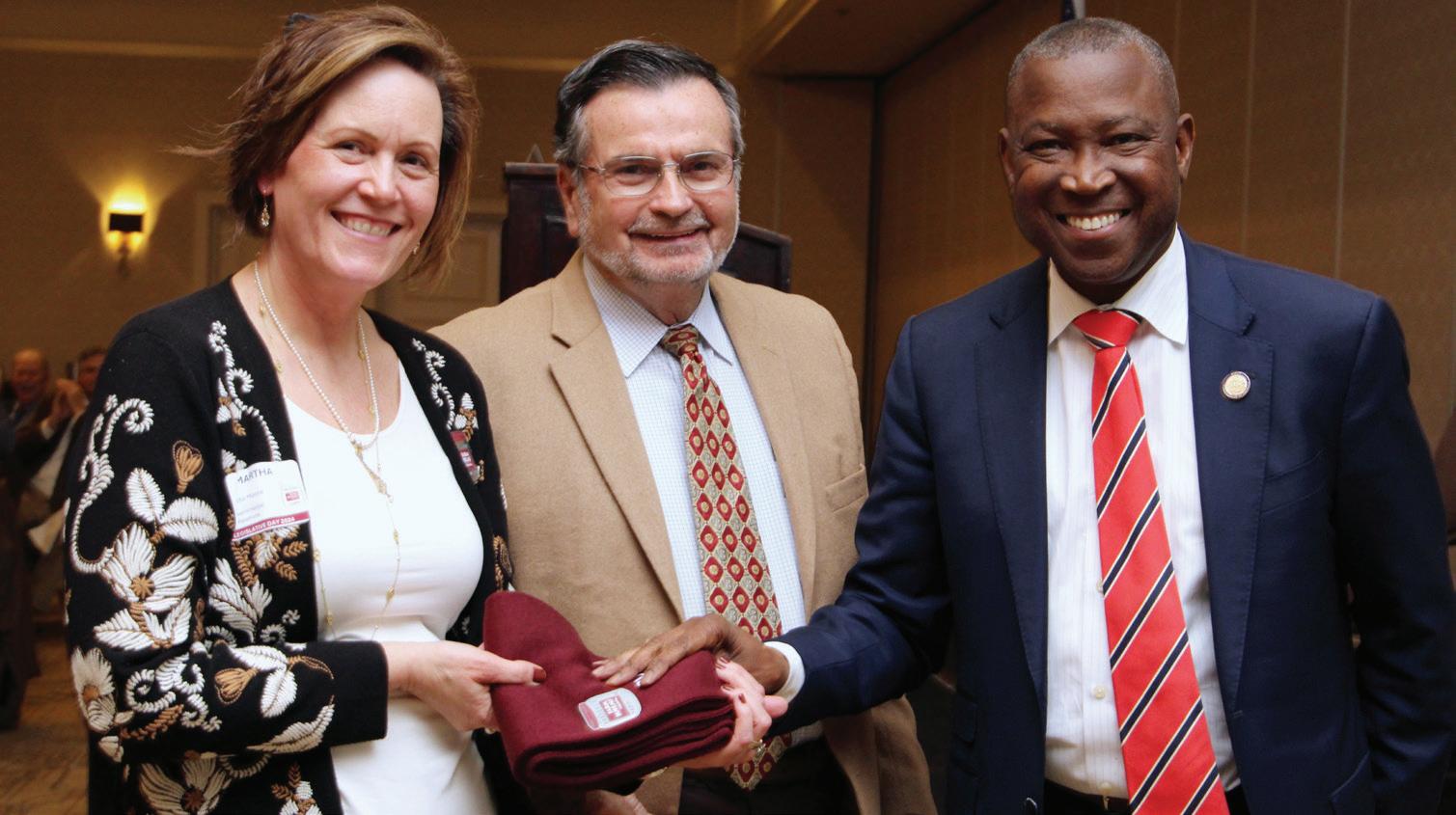
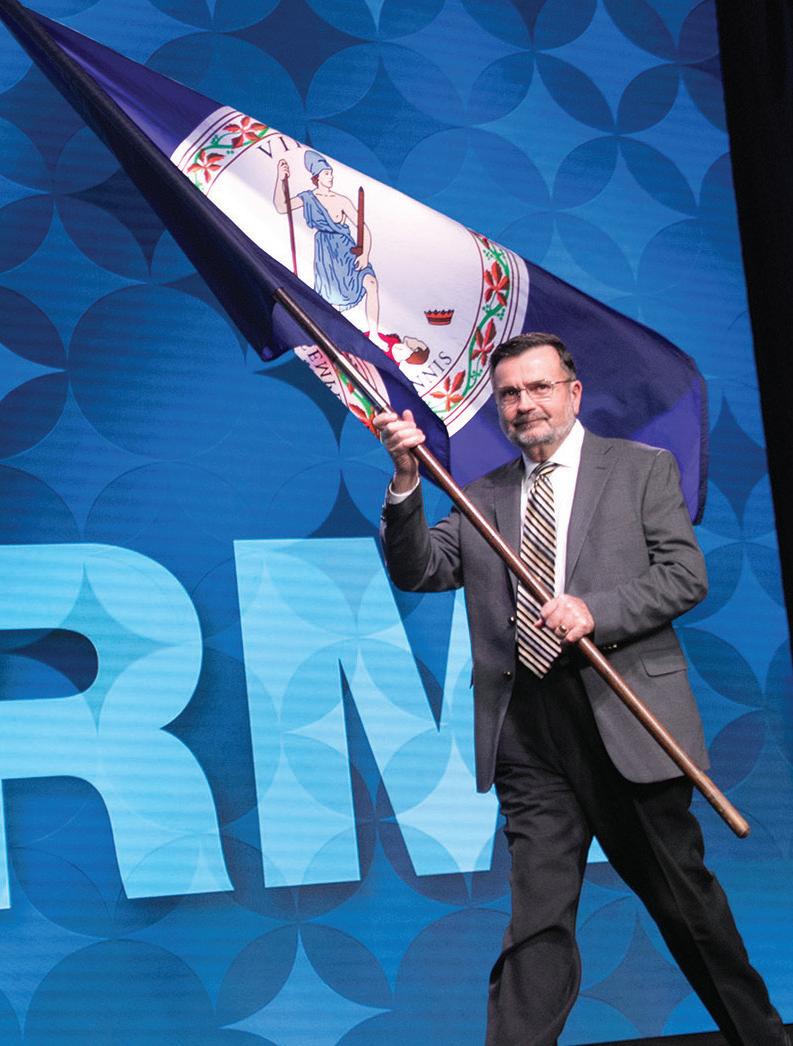
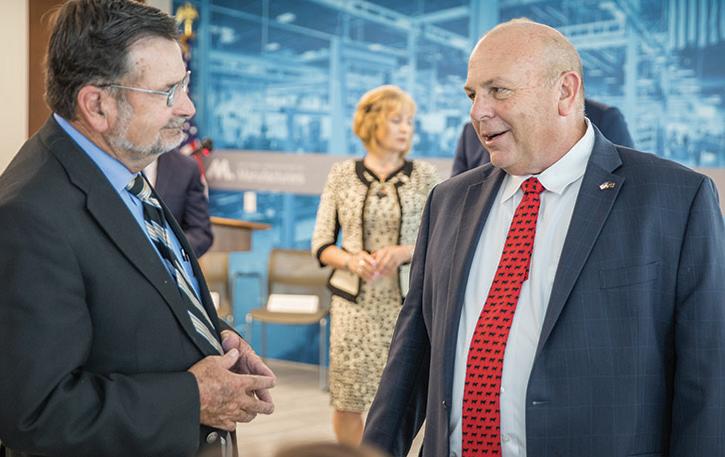
‘Enough is as good as a feast’
Farm Bureau business is bred in the bone, playing out at the Pryor home since childhood. Members often stopped by to submit claims and make payments to his dad, longtime insurance agent Brown Pryor. Combined, father and son have 67 years of service to VFBMIC.
Pryor held a Goochland County Farm Bureau board seat before serving nine years as a District 8 board member, and eight years as state board vice president. He was elected president in 2006 following the retirement of Bruce L. Hiatt.
“I never took it for granted,” he said. “I just come in here every day and try to make a difference.”
When not at the office or traveling, Pryor is a steward of the land. He still grows hay, corn, wheat and soybeans
at Pryoville Farms in Goochland County, with plans to downsize and enjoy traveling with his wife, Pattie.
“For a man whose glass is always half full, ‘enough’ is as good as a feast,” she said.
They first met through a mutual contact at Goochland County Fire & Rescue, where Pryor worked as a volunteer. Early in their courtship, Pattie pulled strings to be off for a long July Fourth weekend from her demanding nursing job.
“Well, we’re cutting wheat if you want to ride with me,” she recalled Pryor saying. “My life and his life were very different. But we have a wonderful friendship as well as love affair.”
Advocating for state and national policy favorable to farming has helped
sustain agriculture and forestry as Virginia’s No. 1 industry. That process kicks off at the annual Resolutions meeting where grassroots members discuss policies and vote.
“I love Resolutions to this day,” Pryor said. “That process of policy development is really who we are.”
VFBF was victorious on many policies in his tenure, including a constitutional amendment protecting landowners against illegal expansion of condemnation authority through eminent domain.
“It’s hard to change a state constitution, as it should be,” Pryor said. “Not many state Farm Bureaus can brag about constitutional changes!”
VFBF also was victorious in advocating for broadband connectivity statewide, land use taxation, and funding for the implementation of agricultural best management
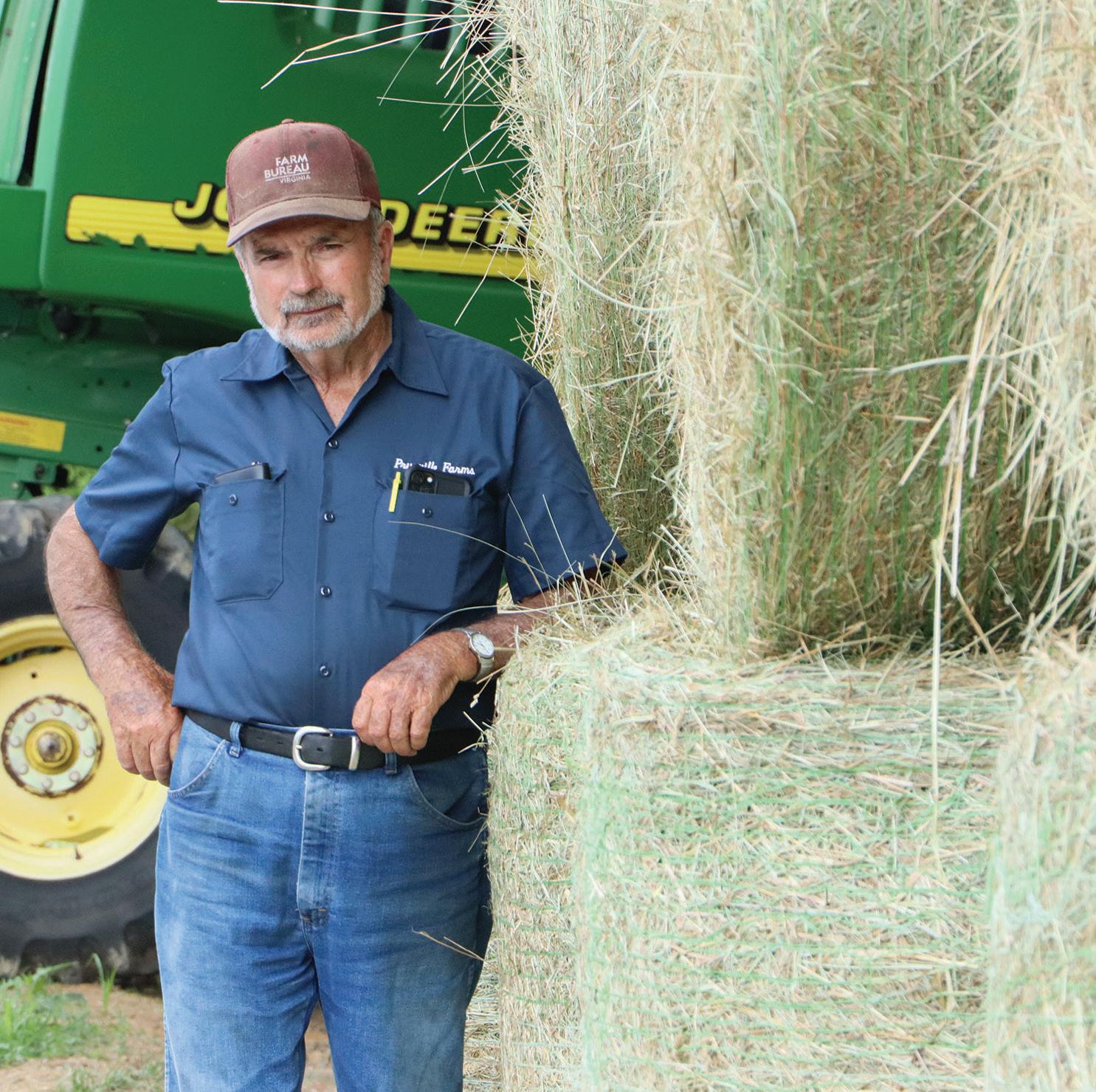
practices to protect water quality. Again, Pryor won’t take the credit. “Martha Moore and her lobbying staff have been instrumental,” Pryor said. “As have the members who have rallied after receiving Action Alerts and when asked to testify at the General Assembly.”
Another point of pride is Pryor’s 26 years of service on the Mississippibased Southern Farm Bureau Life board, with 18 years on the executive committee. SFBL is a $16 billion company with an A+ AM Best rating. Pryor has served as vice president and is currently president until February. When not in the office or baling a hay field, Pryor is on the road. He’s witnessed agricultural activities in almost every U.S. state as part of
American Farm Bureau Federation committees, visiting locales from the Southern border to Washington, D.C.
“I’ve had the opportunity to meet and shake hands with several U.S. presidents, both Democrat and Republican, which is an honor,” he said.
The Virginia Governor’s Conference on Agricultural Trade stems from a meeting between Pryor and the late Dick Crowder, a former U.S. trade representative. The first conference was held at Virginia Farm Bureau’s home office in 2007, and Bob Stallman, AFBF president at the time, was a guest speaker. The conference has evolved over the years, and Pryor credits VFBF with its inception.
Stallman said Pryor is a thoughtful leader and true gentleman.
“It was a privilege to serve with him on the AFBF board of directors and in
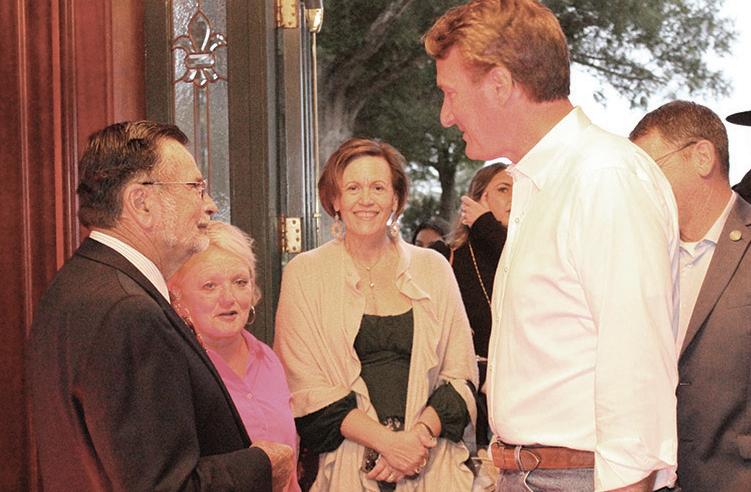
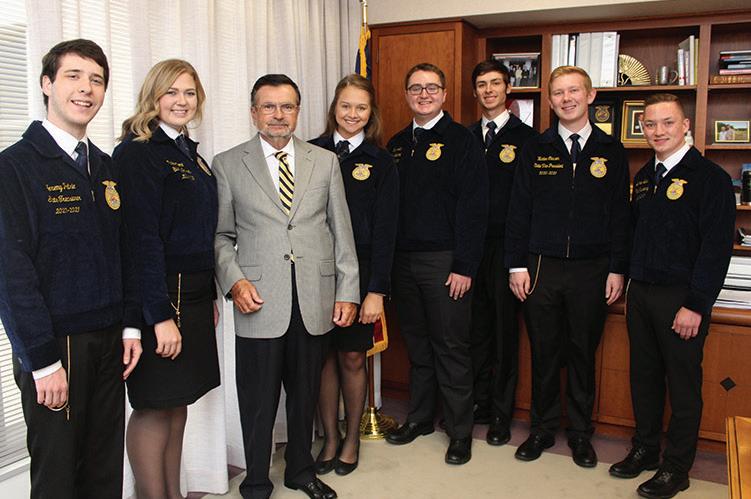
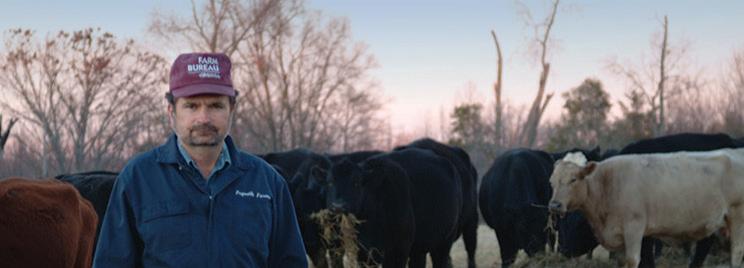
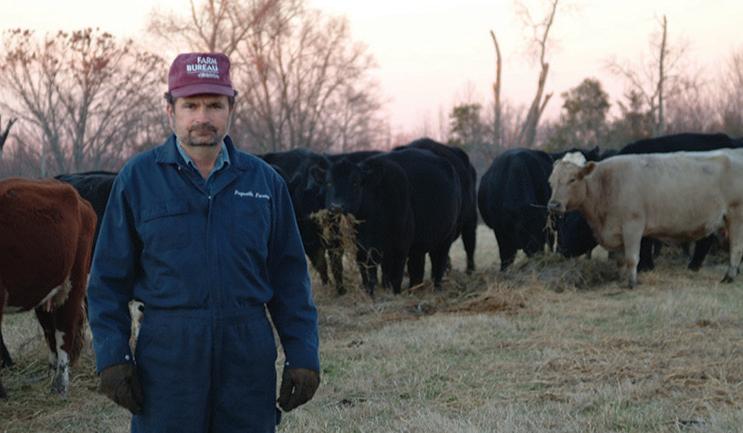
other Farm Bureau roles,” he said. “We dealt with several difficult issues over the years, but I could always count on Wayne's ability to apply his common sense and business skills to help chart a path forward. More importantly, other board members listened to what he had to say! His service to Farm Bureau will long be remembered.”
“It’s been a wonderful tenure,” Pryor said. “Though it hasn’t always been a bed of roses. We invested in things that didn’t turn out well. But that’s just business.”
But one core principle carried him through the darkest days.
“I tell employees they should put faith first, family second and Farm Bureau third,” Pryor said. “Don’t ever let your job get in the way of the first two.”
Membership drives business decisions
Pryor reminds employees that as a membership organization, the company looks after members by providing excellent insurance services and benefits. In turn, he has nurtured the workforce with an open-door policy.
Pryor insisted on hiring general counsel after his first decade as president, “to keep up with everything that needs to be done.”
As the State Fair of Virginia faced bankruptcy in 2012, Pryor was a proponent of buying The Meadow Event Park and the fair.
“I felt strongly that if Farm Bureau didn’t ‘save’ the fair, the agriculturefocused aspects and youth scholarship program would be lost,” he said. “It was very important that heritage be kept alive. And the federation got every dollar back.”
Pryor also was invested in ongoing maintenance at the corporate office while whittling down the bank note, paid off in 2022.
“It’s hard to believe this building is 30 years old!” he said.
In 2010, Pryor commissioned the creation of the farmer statue in the office lobby—symbolizing the organization’s central mission of farmer advocacy.
“I’ve done very little,” he said. “But as a company, employees and a board, we’ve done a lot. My goal was to leave things a little bit better than when I got here. I’m just humbled, thankful and honored.”
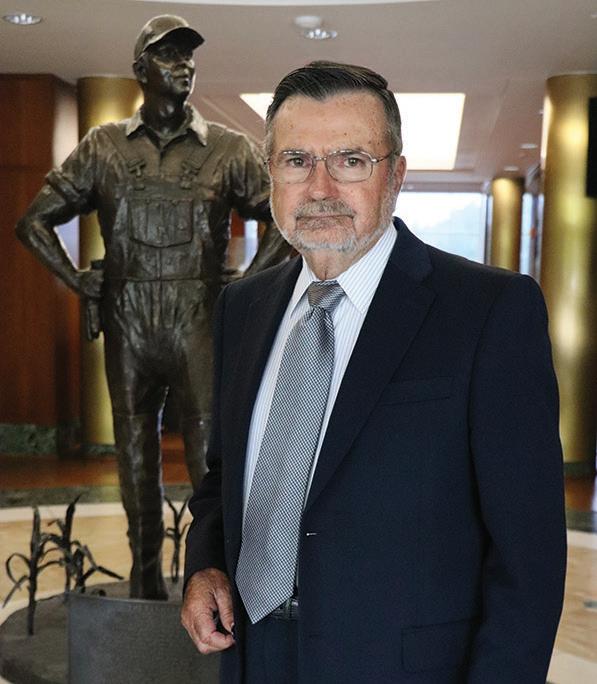
In 36 years serving on the Farm Bureau board, Pryor has:




Traveled 500,000 miles in the company car; and 500,000 by air.
Taken 125 trips to Mississippi for Southern Farm Bureau Life.

Attended all 88 county Farm Bureau annual meetings at least once.
Witnessed 40 state board members come and go, prior to the sitting board.
Ensured the 30-year note was paid off for the home office’s $12 million property.


Spearheaded 14 board districts being in alignment with Membership & Field Services, Women’s Leadership and Young Farmers Committee districts.


Been reelected eight times.
Had four encounters with U.S. presidents.

Chartered four new board committees: Executive • Finance • Governance • Compensation
Oversaw acquisition of two companies— Countryway Insurance in 2011 and Benefit Design Group in 2012.


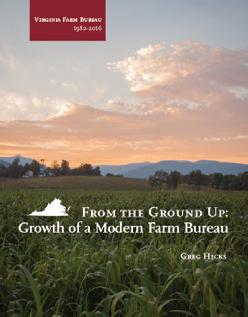


Oversaw one Virginia Farm Bureau history book, published in 2017.


BY NICOLE ZEMA
The generation gap narrows at the grassroots level.
The Silent Generation’s wisdom helped strengthen Virginia Farm Bureau Federation as the state’s largest farming advocacy organization, while Gen Z’s community-minded enthusiasm will propel it into the future.
Shenandoah County Farm Bureau President Chuck French, 47, is a Gen X leader who often agrees with the perspectives and ideas of his younger board cohorts.
“But it’s the senior leaders who are more traditional in their views bringing balanced discussion to the room,” he said. “With so much Farm Bureau involvement in politics on the local level, those leaders can remember what happened with similar issues that came up 40 years ago.”
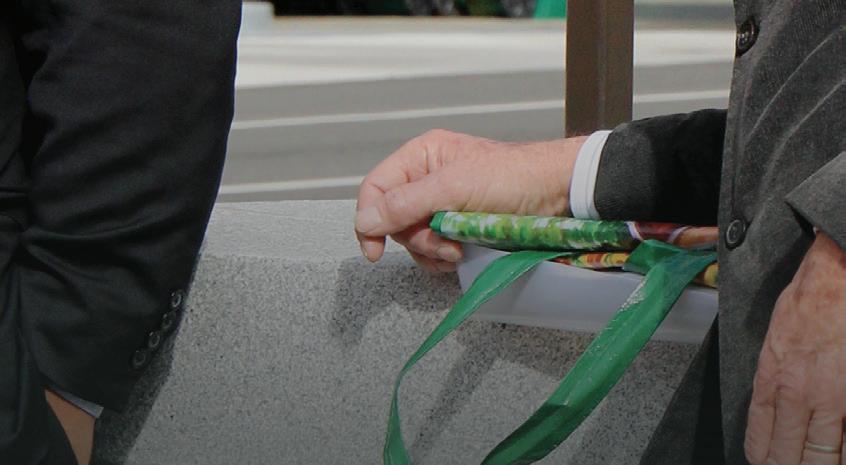
Howard Nester, 81, Chesterfield County Farm Bureau president; and Díaz Tompkins, 24, sargeant at arms
With over 20 years as Chesterfield County Farm Bureau president and a lifetime in various poultry, cattle and vegetable operations, Howard Nester has abundant knowledge to share with Gen Z board sergeant at arms Díaz Tompkins.
“And I learn from him too,” Nester said. “It’s mutual. He knows modern techniques that I don’t use.”
Their paths frequently crossed as volunteers in county organizations. Tompkins asked Nester about the possibility of a board seat, and started in 2022 as a board director.
“He’s got his eye on the ball,” Nester continued. “We sit in my shop and talk about life, the future, family. His

knowledge of farming is phenomenal.” Theirs is a friendship that bridges multiple decades, and Tompkins sees Nester as a grandfather-like mentor.
“When I’m helping him, he’s always teaching me how to fix something,” Tompkins said. “Every single time he talks, I learn something new. The information we share is symbiotic. He learns from my approaches too, while making me aware of things I overcomplicate.”
Nester admitted he tends to ramble in board meetings and deviate from the topic.
“Díaz is the facilitator of board meetings because I talk too much!” he said. “I need someone to keep me on track and out of the weeds.”
When Nester had health issues, Tompkins helped on his farm and led the board in his stead.
“I was Howard’s envoy per se,” he recalled. “I would brief
him on the situations, what our members and the state think, and then get his perspective.”
Tompkins said he learned leadership skills through observing Nester’s networking abilities, listening skills and maintenance of productive relationships.
Younger farmers interested in leadership opportunities should just go for it, Tompkins said.
“Sometimes you may be the only young person at the table,” he continued. “Hear the conversation, listen to thoughts and opinions. With every new experience, pick out one thing you can take away that gives you better understanding.”
Tompkins plans to pursue Farm Bureau leadership and outreach opportunities into the future.
“He’s an upcoming star,” Nester said. “We can always depend on him. I see him in management of the board someday.”
Adam Marston, 29, Shenandoah
Adam Marston was urged to seek a leadership position within Shenandoah County Farm Bureau in 2019 after hosting a successful tour of his produce and greenhouse operation called Adam’s Apples & Herbs during the VFBF Young Farmers Summer Expo.
His sector of agriculture diverges from traditional farming activities in the Valley.
“I have a room full of cattle, crop, poultry and dairy farmers,” French said. “But I didn’t have anyone who grows produce with a farmstand market. Adam often has ideas or ways of looking at things that a cattle farmer may not. What he’s brought to the board is immeasurable.”
Now in his third term, Marston serves as board secretary.
“There is more responsibility every
year,” he said. “I try to jump in where I can and do what needs to be done without getting in the way. I’ll stay on the board as long as they want me.”
As the youngest board member, he trusts the perspective and guidance of his seniors.
“I learned how to listen better,” he said. “Younger leaders don’t know what we don’t know! Now there are more people involved closer to my age with fresh ideas. It’s important to put those ideas out there, and also important for ideas to be shot down sometimes. Everybody has a voice, and we can often meet in the middle.”
Gen Z farmers seeking leadership opportunities can start small, Marston said. Talk to a member,
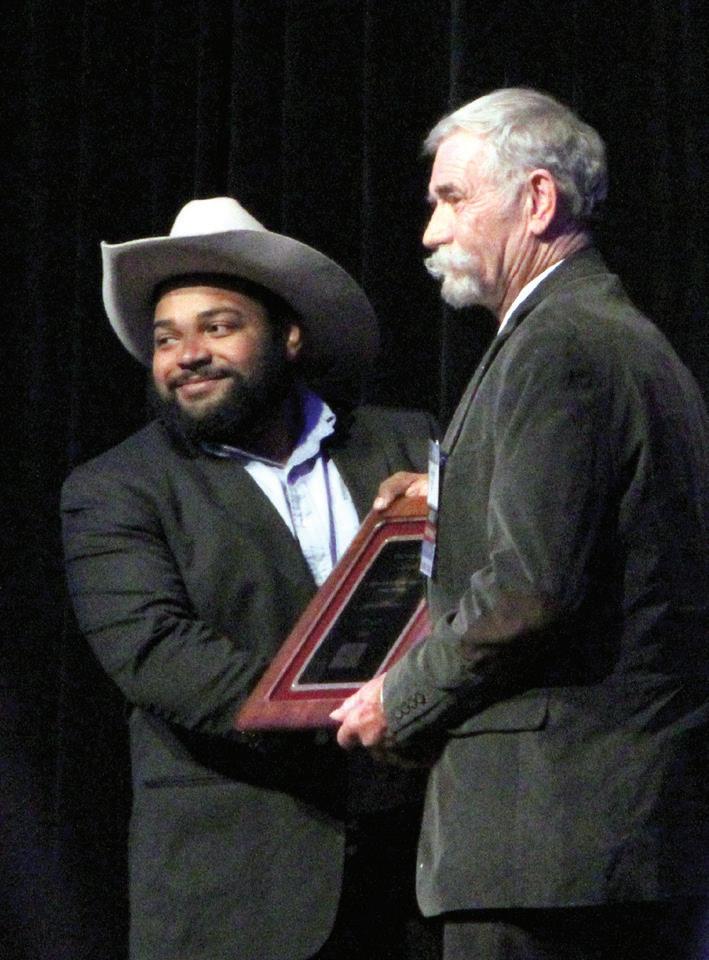
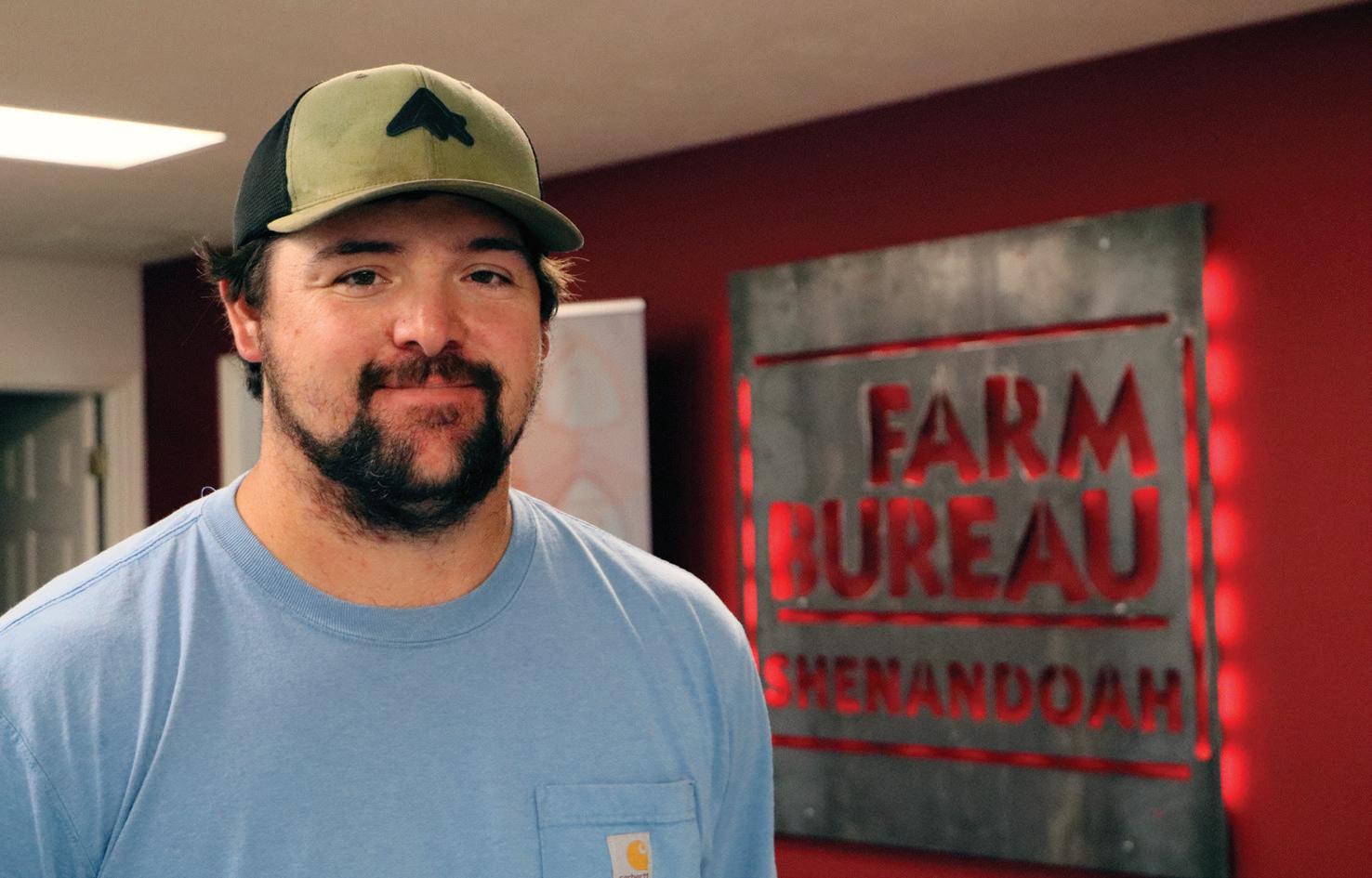
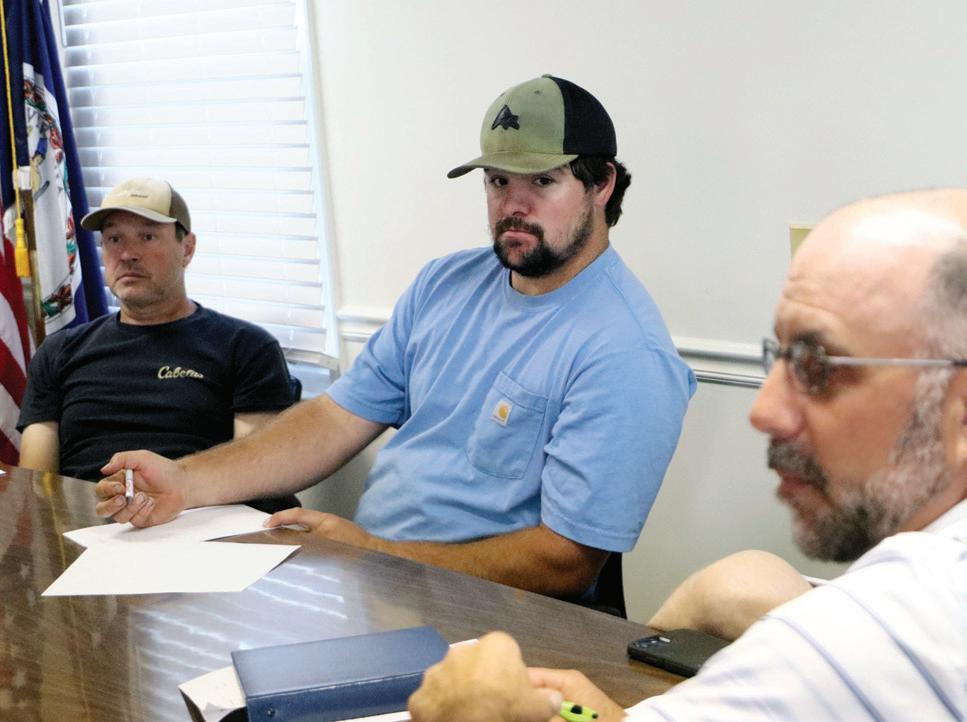
come to a meeting, volunteer at an event, or visit the Farm Bureau exhibit at the State Fair of Virginia.
Ann Slemp, 80, Lee County Farm Bureau president
Ann Slemp moved through a crowd of men at the VFBF Annual Convention parade of presidents in 1981, looking for her assigned spot.
“Ma’am, I think you’re in the wrong place,” a county president said to her.
“I don’t think so,” Slemp retorted.
The unflappable Lee County Farm Bureau leader made VFBF history as the first woman elected as a county board president.
“Being the only woman didn’t intimidate me a bit,” she recalled. “If anything, maybe I intimidated them!”
In 40-plus years, Slemp has served under five state presidents. Her steadfast leadership expanded the local organization from 500 members to over 3,000, raising the visibility of Virginia’s most far-flung county.
“We accomplished a lot, and it’s still growing,” she said. “My biggest thing is fighting for the farmers, and we’ve had some doozies of fights! I guess that’s why they’ve kept me all these years.”
As president, Slemp helped organize a tractor parade protesting tobacco tax increases. She fought for land use assessments on farmland, farmer tax exemptions and fair rates for tobacco loss assistance. She solicited General Assembly support for eminent domain laws, farmland preservation and water quality issues.
Involved with Farm Bureau since 1975, Slemp also served on her county Farm Bureau’s Women’s
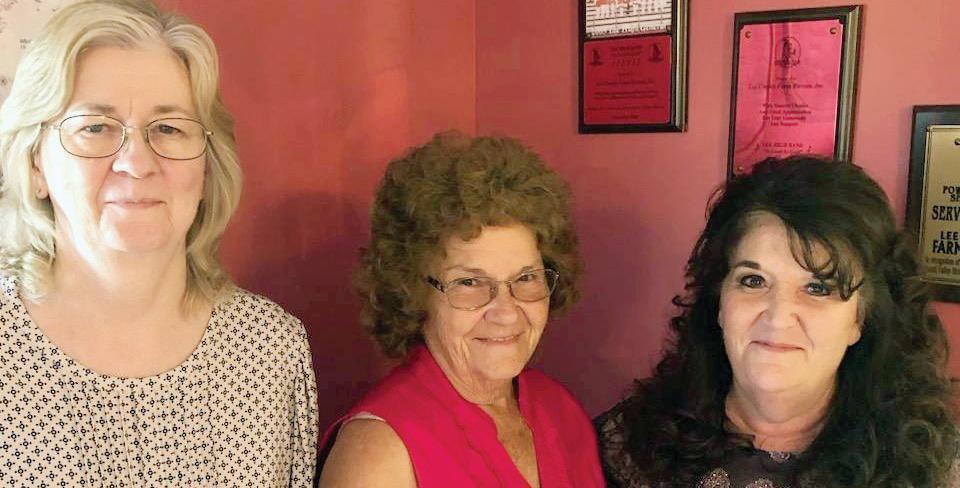
Leadership Committee, and on dozens of civic, school and hospital groups. She was honored as VFBF’s Farm Woman of the Year in 2012.
Though husband and county board member Justin “Hop” Slemp died in 2016, the family still farms hay, cattle, corn and silage on about 1,500 acres. She keeps going.
“If I slowed down, I’d croak,” Slemp joked. “There is still more to get done.”
Other board members, including Gen-Z counterparts, have not expressed interest in taking over her volunteer leadership position.
“‘You got to be kidding me,’” they’ve said to her. “‘I wouldn’t have your job!’ But I’d do anything to find someone, step down and let them have it.”
Slemp also oversaw the purchase of a new county Farm Bureau office, and its subsequent additions.
Her legacy is recognized with a bronze plaque that dedicates the office to her “hard work, leadership and devotion.”
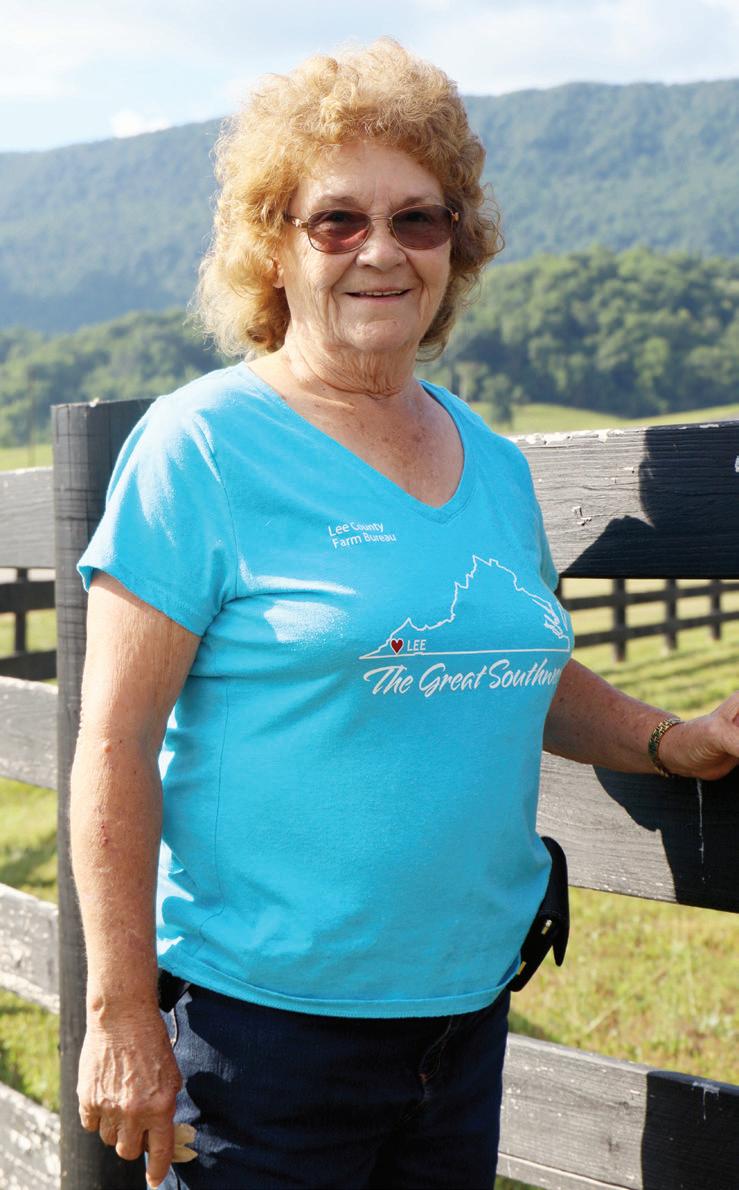
’
Virginia 4-H: Empowering youth for over a century
BY ALICE KEMP
Since the early 1900s, Virginia 4-H has been committed to shaping minds, cultivating leadership skills and encouraging community engagement among the state’s youth.
“4-H uses experiential learning to help young people be better citizens and better individuals in the working world,” said Chad Proudfoot, Virginia 4-H organizational specialist at Virginia Tech. “All of the programming revolves around forming areas of agriculture, civic engagement, healthy living and STEM education. We want youth to become wonderful and positive adults.”
The national 4-H movement dates to the late 1800s, beginning as corn clubs where farm boys competed to grow the highest quality crops. These clubs taught youth to use
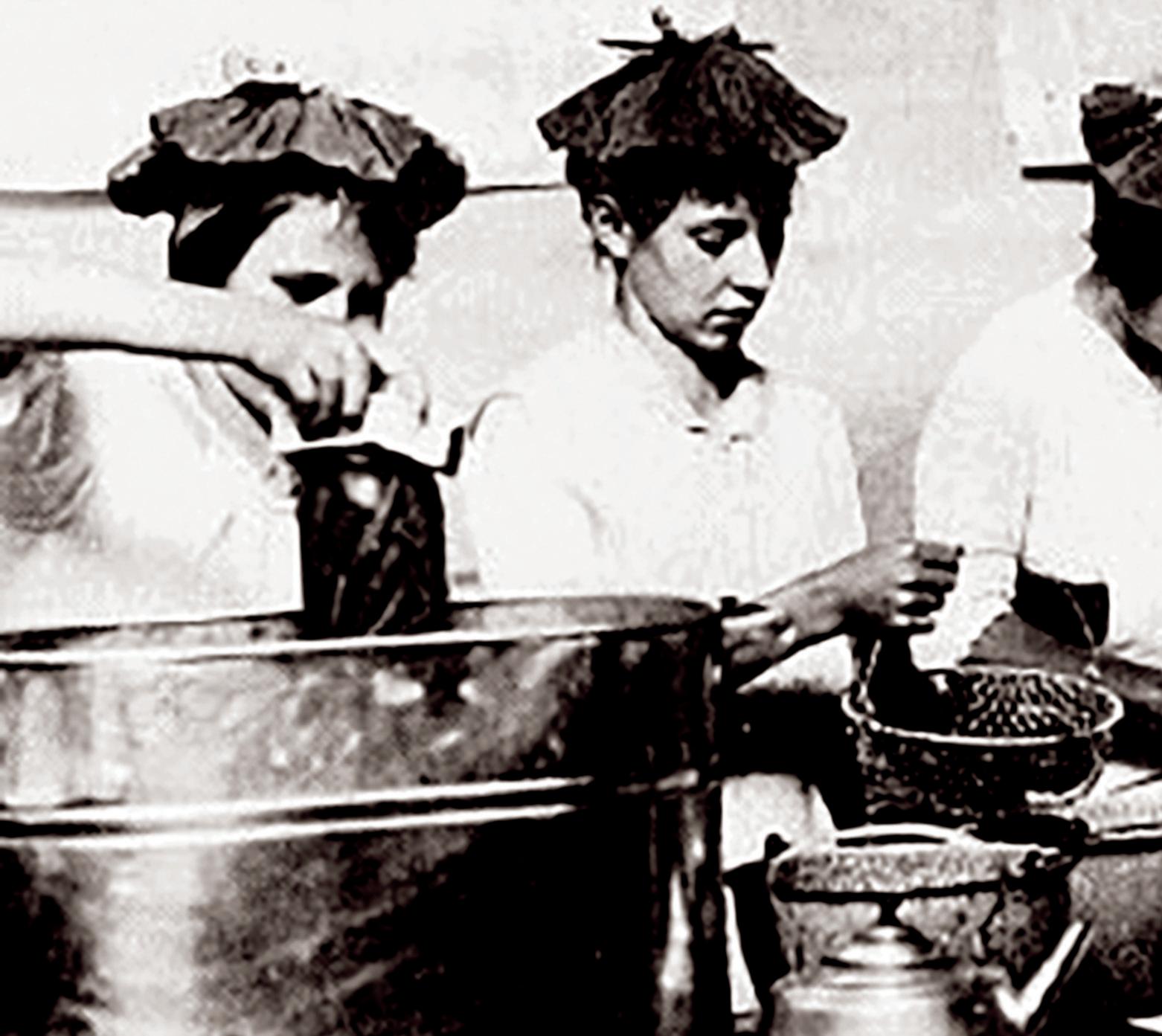

science and experiment with new methods to improve agriculture, while encouraging personal achievement.
The movement made its way to Virginia in 1908, when Virginia Cooperative Extension agent F.S. “Southall” Farrar founded Virginia’s first corn club in Dinwiddie County. That marked the beginning of Extension’s youth programming.
The following year, Ella Agnew, the nation’s first female Extension agent, began working with rural girls on home economics like food preservation and gardening. These gatherings soon became known as tomato or canning clubs.
But in the segregated South, these clubs were only open to white youth. To provide opportunities for rural minorities, John Baptist Pierce, Virginia’s first African American farm demonstration agent, began
working with African American boys in corn clubs during the 1910s.
In 1913, Extension agent Lizzie Jenkins was appointed to organize canning clubs for African American girls in Virginia.
“The clubs had similar goals,” Proudfoot said about the organizations, which elected officers, held competitions and taught vocational skills. “The African American clubs had a vibrant membership, leaders and developed their own culture and traditions in 4-H.”
The boys’ and girls’ clubs soon combined, operating as community clubs, and adopted the clover emblem. Following the Civil Rights Act of 1964, the clubs were desegregated, and over the years, the iconic four-leaf clover—representing the head, heart, hands and health—has
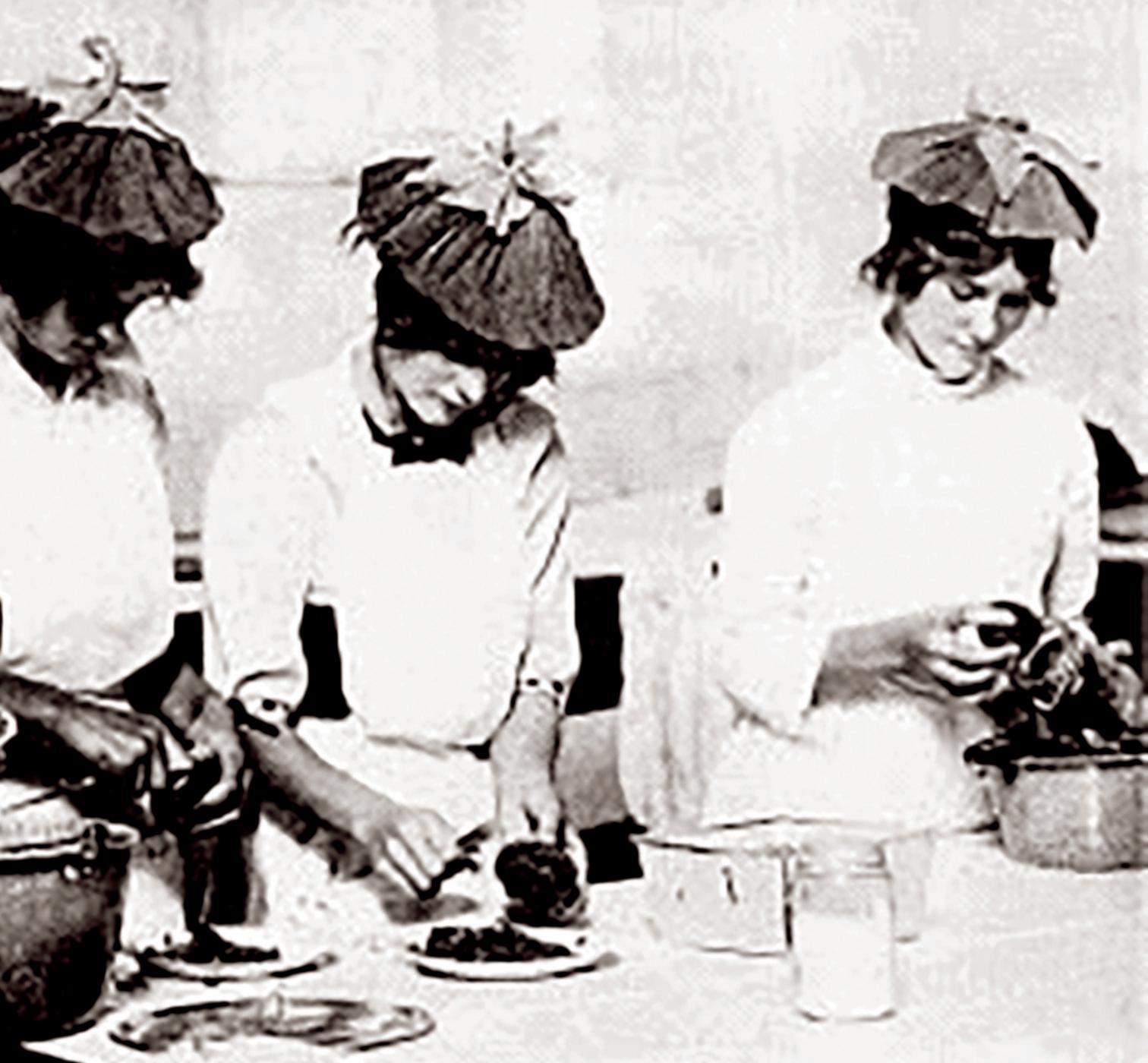
become one of the most recognized symbols around the globe.
“It’s known as four-fold youth development,” Proudfoot explained. “If you have programming set up to engage youth to use their heads, hearts, hands and health together, that will help get them started on a good path in life.”
4-H is more than an extracurricular activity for Sarah Gregory and her family. It’s a legacy of education, community connection and leadership that has spanned generations.
Gregory’s parents were 4-H volunteers and encouraged their children’s involvement at an early age. Growing up on a small farm in Chesterfield County, she and her siblings balanced farm chores
alongside their 4-H meetings.
“My mom always told us, ‘Find something you like to do,’” Gregory reflected. During the 1950s, she attended 4-H classes and workshops at Virginia State College, now Virginia State University, where “we learned everything we could.”
Gregory participated in home economics and agricultural programming and excelled in sewing. She competed at local and state levels, led club meetings, and credits the organization for building confidence and life skills.
“We would practice together and do our presentations,” she reminisced. “It’s how we learned public speaking—how to talk to people.”
Gregory has been involved in 4-H since the days of racial segregation— when she couldn’t fully benefit from everything the organization
had to offer—through today as she volunteers and educates youth from all backgrounds. She leads multiple 4-H programs, including the Chesterfield County 4-H Business Bunch Club, a civic service and youth leadership development organization. She also advocates for 4-H and spoke at the Virginia General Assembly for funding and support. Her 60-plus years of volunteering led to multiple awards and her induction into the National 4-H Hall of Fame in 2022.
Understanding the value of handson vocational skills, she instilled that same passion for 4-H in her daughters, Selicia Allen and Shawnda Randall.
“In our club we were officers, vice president. I think we did all of it,” Allen said. “We were always learning leadership skills.”
Like their mother, the sisters focused on home economics and competed in cooking demonstrations.
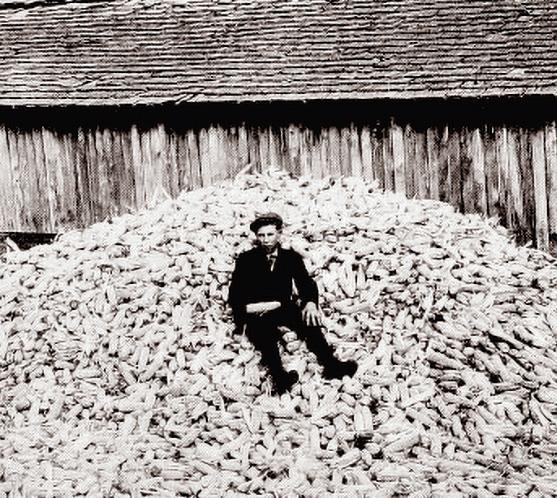
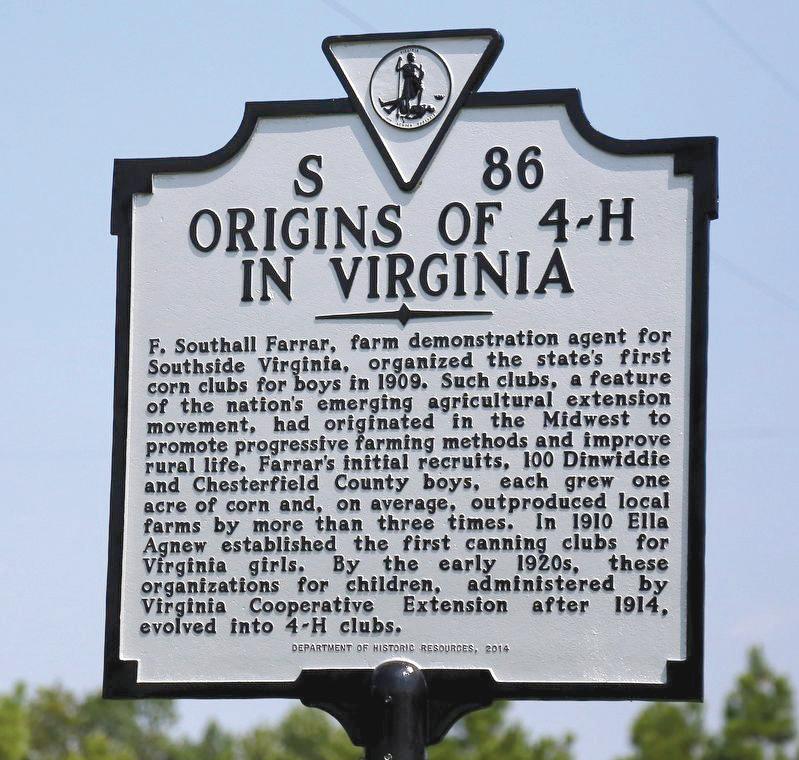
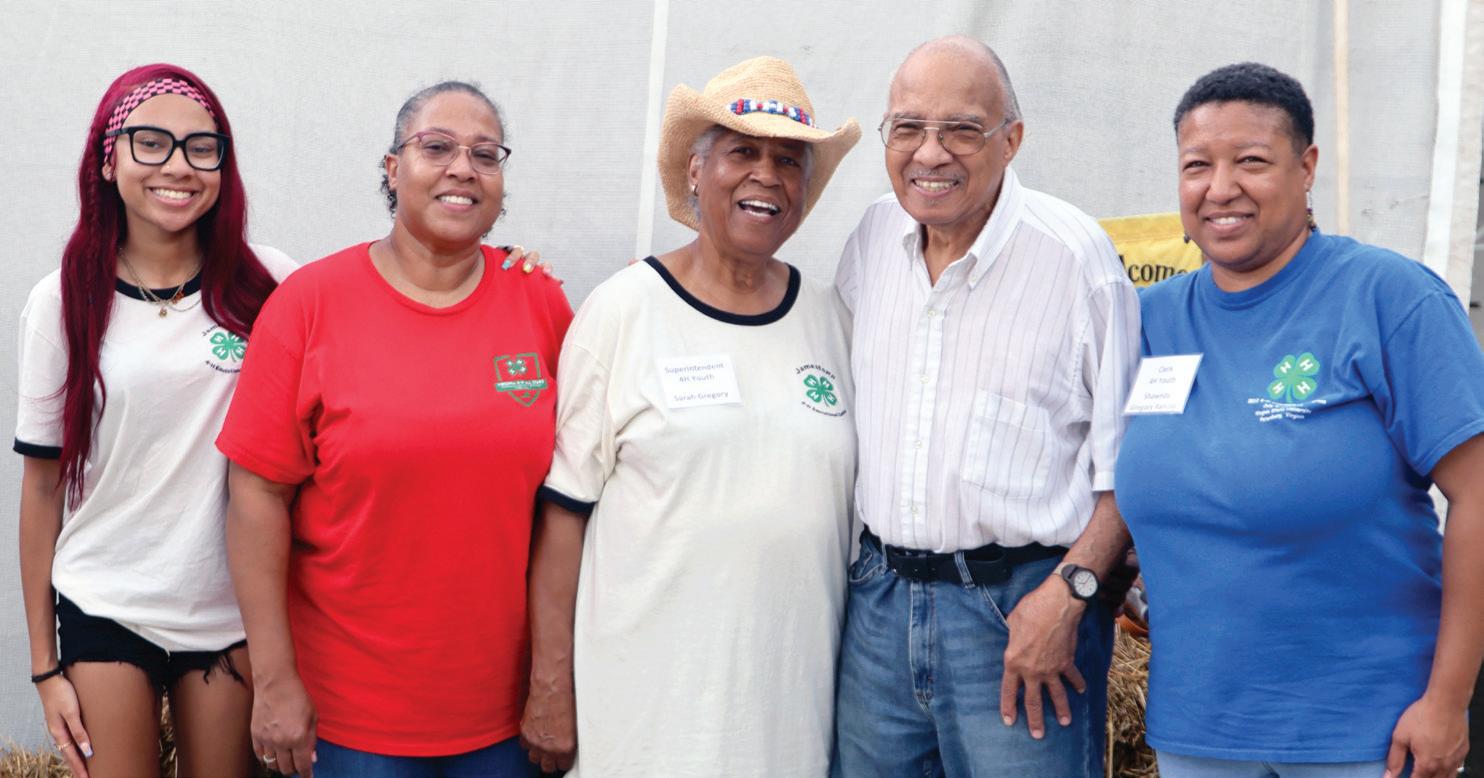
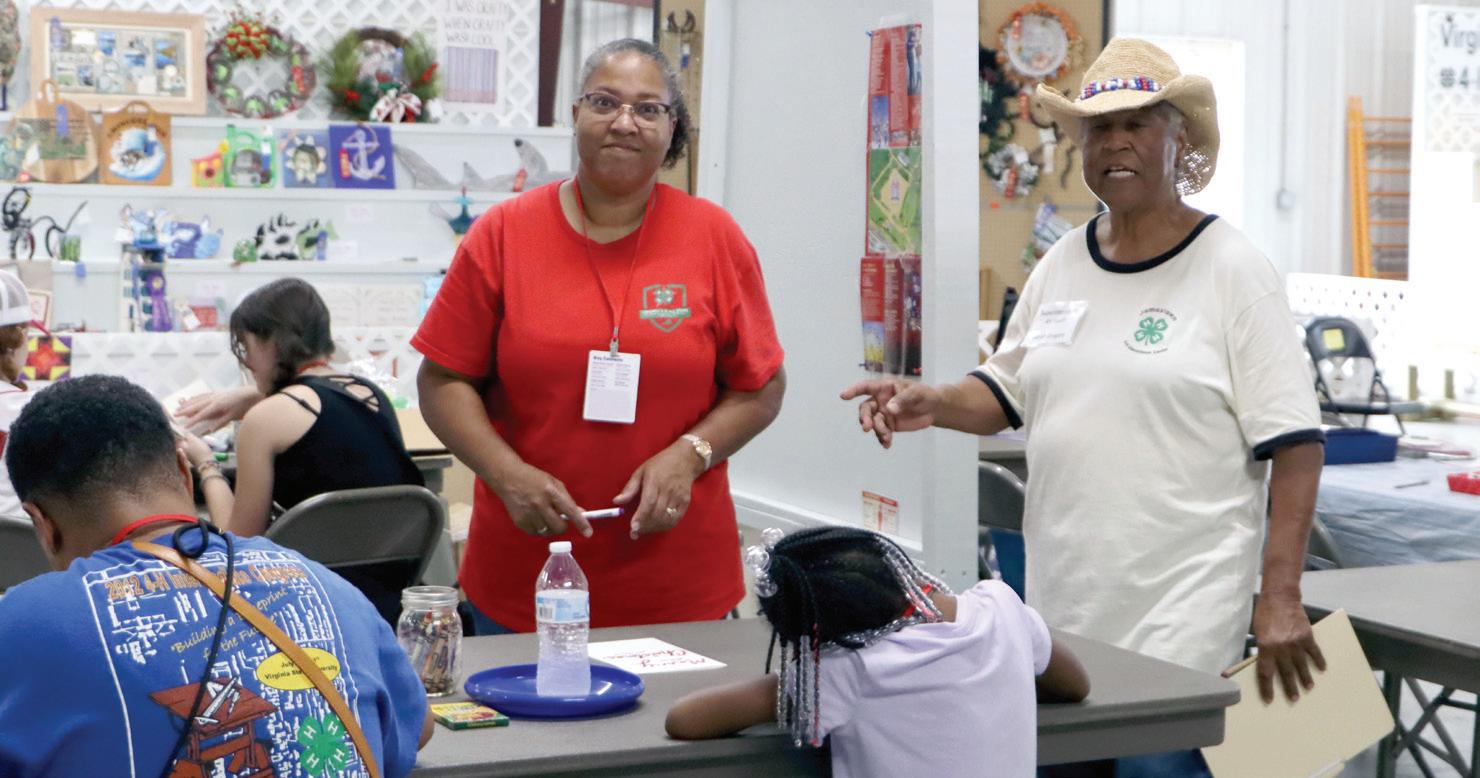
They traveled as part of the 4-H international exchange program. Randall went to Finland, and Allen to Greece, where she toured tobacco fields and vineyards.
For Randall, interacting with members from across the commonwealth and judging competitions at the annual 4-H State Congress helped her and others “get out of their shells”—something that aided her throughout her teaching career.
“It’s built a foundation that guides you through life, and teaches you how to be successful,” Randall said.
And even after aging out of the program, the sisters remain active club volunteers and facilitate
projects like 4-H arts and crafts events at the Chesterfield County Fair. They were named Virginia 4-H All Stars, the highest recognition given to members who encourage youth development in local clubs.
While early 4-H programming focused on agriculture and homemaking skills for rural youth, the organization evolved between the 1980s and early 2000s to incorporate new subjects like STEM, civic engagement and the arts. Today, Virginia 4-H offers a diverse range of programs designed to interest students in rural, suburban and urban communities.
“You learn a lot of life skills and it’s not just focused on one audience,” said Renecia Allen, Selicia’s daughter. “Whether you’re interested in art, science, gardening or animals, there’s something for you.”
As a teen counselor to younger 4-H members, Renecia continues the family tradition of youth enrichment and service. She guides younger members through workshops, competes in public speaking contests, and develops career skills under her grandmother’s guidance in the Chesterfield 4-H Business Bunch Club.
“It’s really nice knowing my family contributed so much in 4-H and that it’s something I get to experience too,” she said.
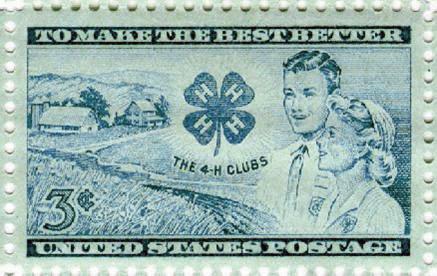
4-H is the largst non-formal youth educational organization in the U.S.
Virginia 4-H has approximately 160,000 members and around 5,500 adult volunteers.
There are 4-H clubs in each of Virginia’s 95 counties and in most independent cities.
4-H is available in every county in each state, and in 82 foreign countries.
Virginia’s program offers over 100 different clubs and has six educational centers.
4-H State Congress, held annually at Virginia Tech, draws hundreds of youth from across the state to compete and focus on leadership and citizenship.
Jewel Bronaugh, the 14th Deputy Secretary of Agriculture and first African American deputy secretary, was a Virginia 4-Her.
The fourth letter in the 4-H clover emblem originally stood for “hustle” until it changed to “health” in 1911.



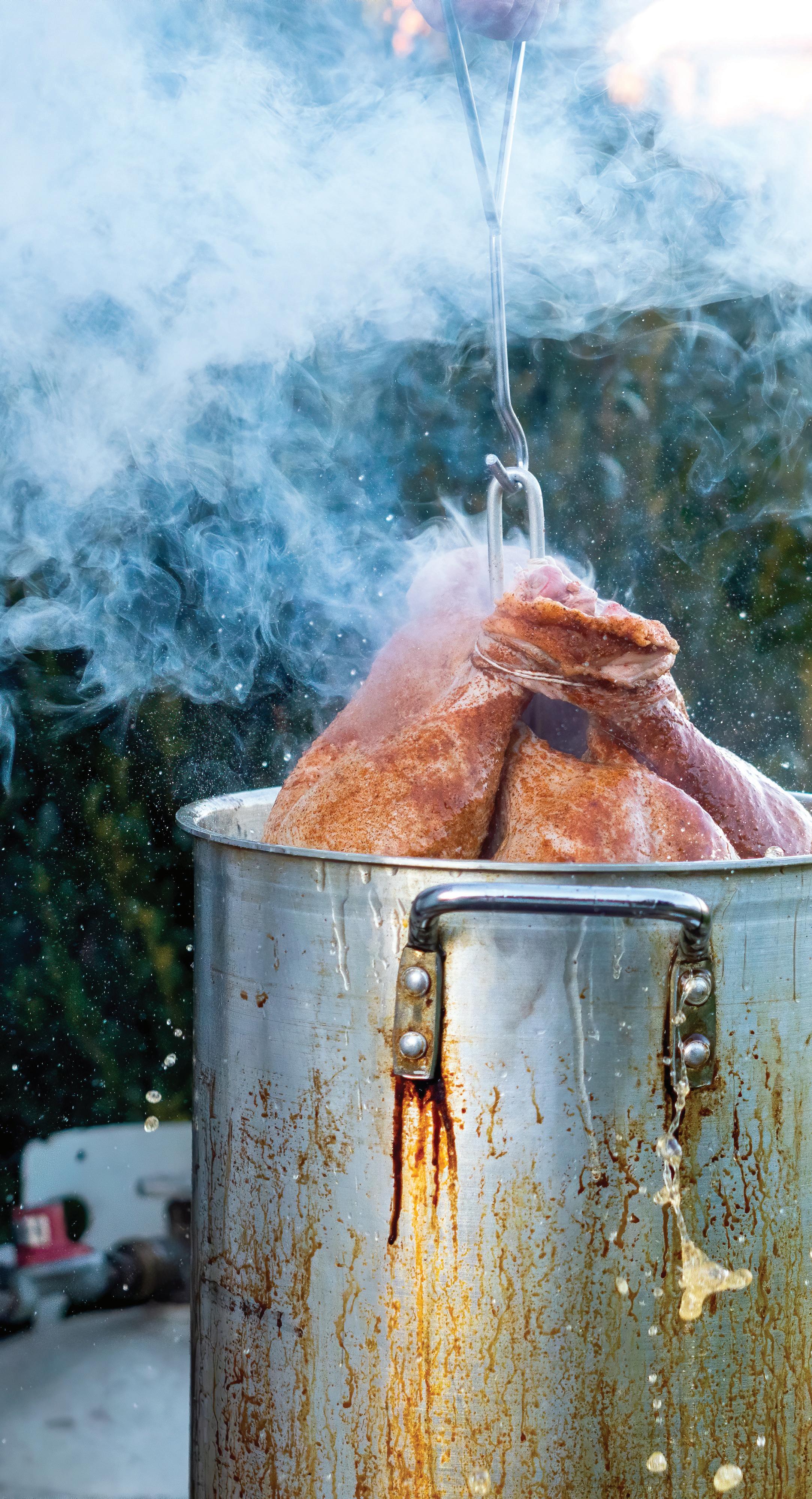
BY NICOLE ZEMA
As the year’s end draws closer, holiday celebrations, savory feasts and festive displays can be fully enjoyed with preventive safety measures.
“Just a few precautions to prevent fire and injury can keep your home and family safe during the upcoming holidays,” advised Scott DeNoon, vice president of underwriting and policy services for Virginia Farm Bureau Mutual Insurance Co. “This includes testing smoke alarms, and ensuring flashlights, fire extinguishers and electrical decor are ready for use.”
The kitchen is the heart of the home, and the source of most home fires in the U.S. Thanksgiving is by far the leading day for home cooking fires, according to the National Fire Protection Association.
Guests, television and other activities can distract attention from the kitchen. Unattended cooking is the primary factor contributing to cooking fires and casualties.
» Always stay in the kitchen while frying, boiling or broiling food.
» Check food regularly while simmering, baking or roasting, and use a timer.
» Keep flammable items like potholders, wooden utensils, food packaging, towels or curtains away from the stovetop. Keep children at least 3 feet away.
» Keep a fire extinguisher nearby.
» Small grease fire: Smother it by sliding the lid over the pan and turn off the stovetop. Leave the pan covered until completely cooled.
» Oven fire: Turn off the oven and keep the door closed.

» In case of a kitchen fire: Leave the home, and close the door to help contain the fire. Call 911 from a safe place outside.
—Arlington County Fire Department

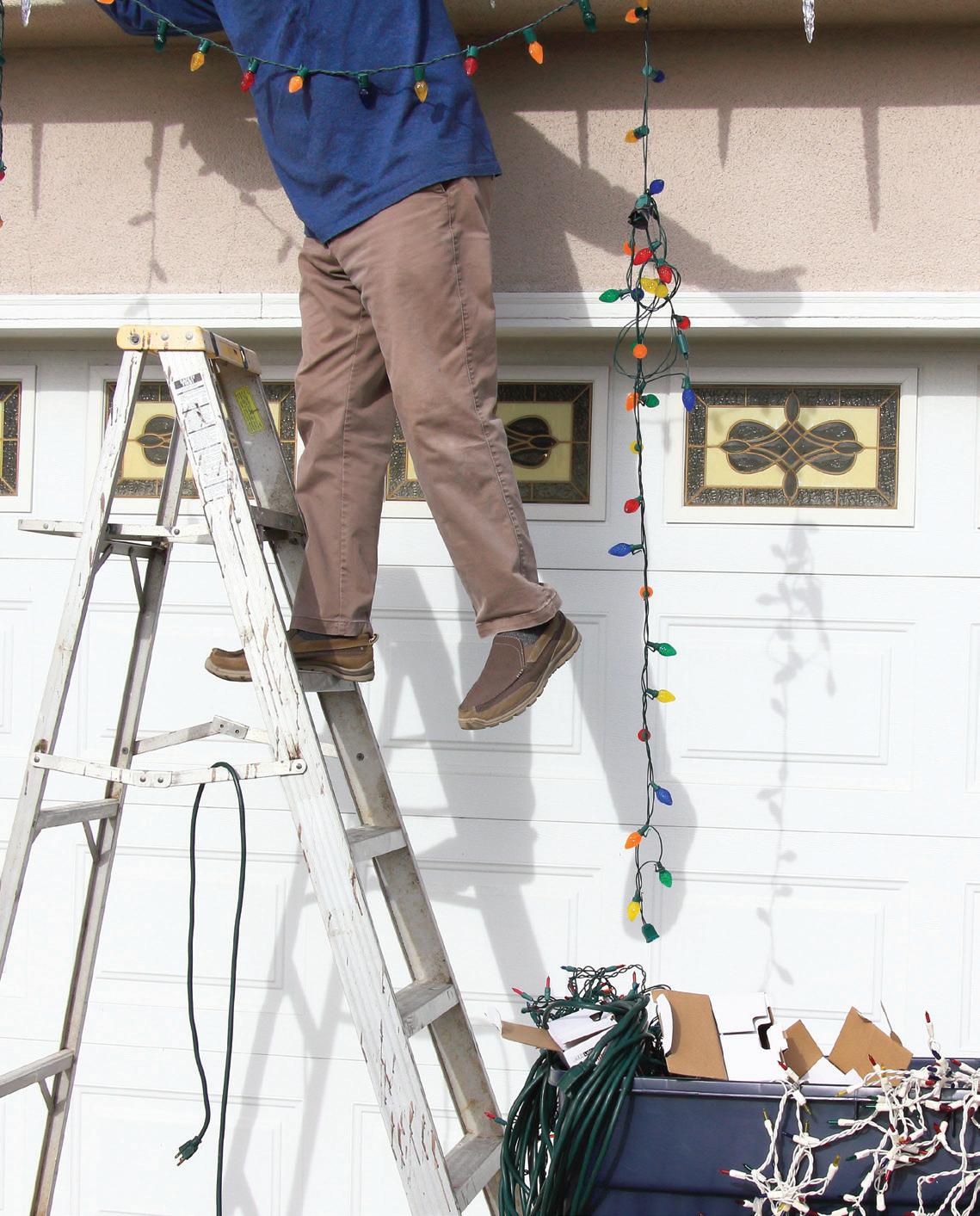

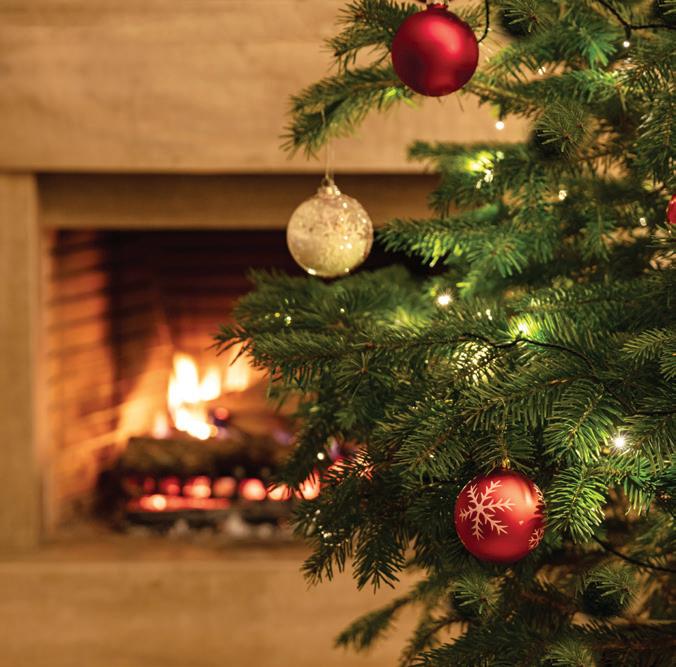




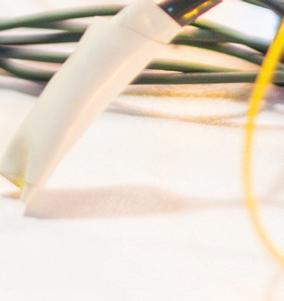




Christmas
Christmas trees account for hundreds of fires annually, with 33% of those occurring in January, according to NFPA. The longer a natural tree is kept after Christmas, the higher the fire risk.
Christmas tree safety
» Place tree away from heat sources, and use only nonflammable decorations.
» Inspect lights for frayed wires or defects before use.
» Do not leave lights on unattended.
» Keep the stand for a fresh-cut tree full of water, and discard a dry tree immediately.
— Smyth County Public Safety
Outdoor décor safety
» When purchasing new lights designed for outdoor use, the American Safety Council recommends LED lights, which burn cooler than incandescent lights.
» Read and adhere to safety information from a reputable manufacturer.
» Plan your lighting display around available light sockets, plugged in to a ground fault circuit interrupter, or GFCI, outlet.
» Do not overload sockets or connect more than three strands of incandescent lights.
– American Safety Council




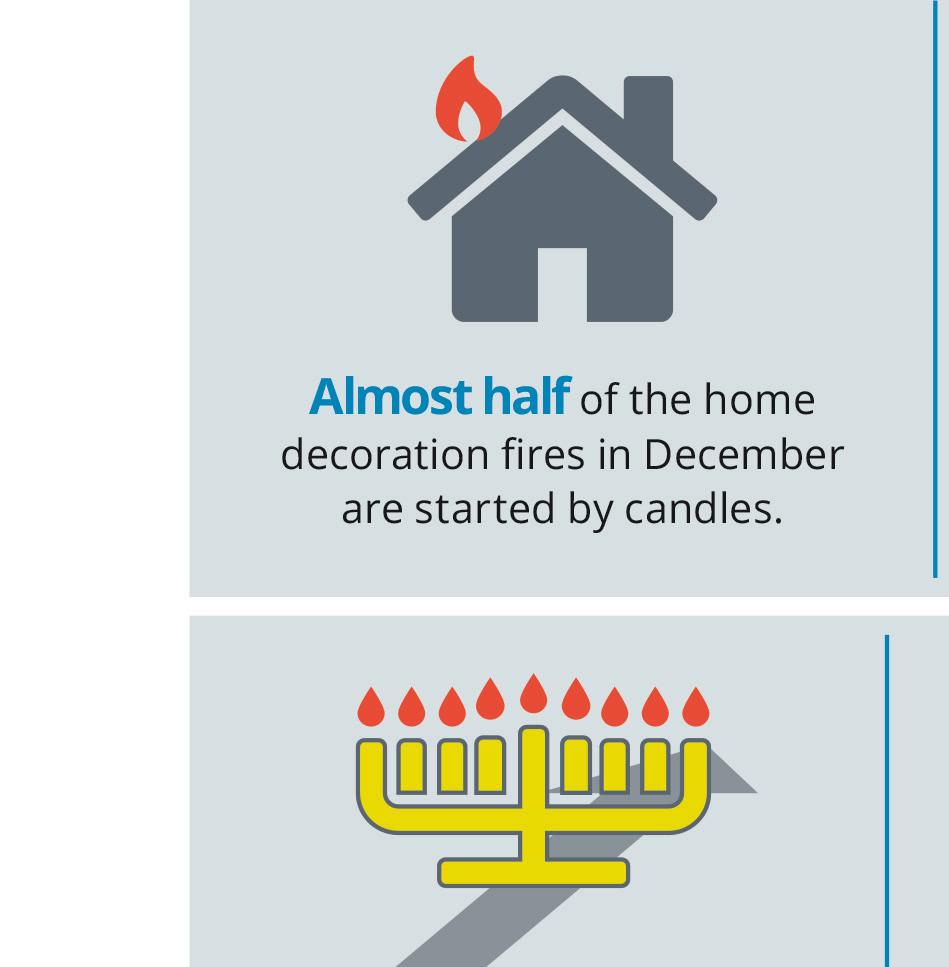
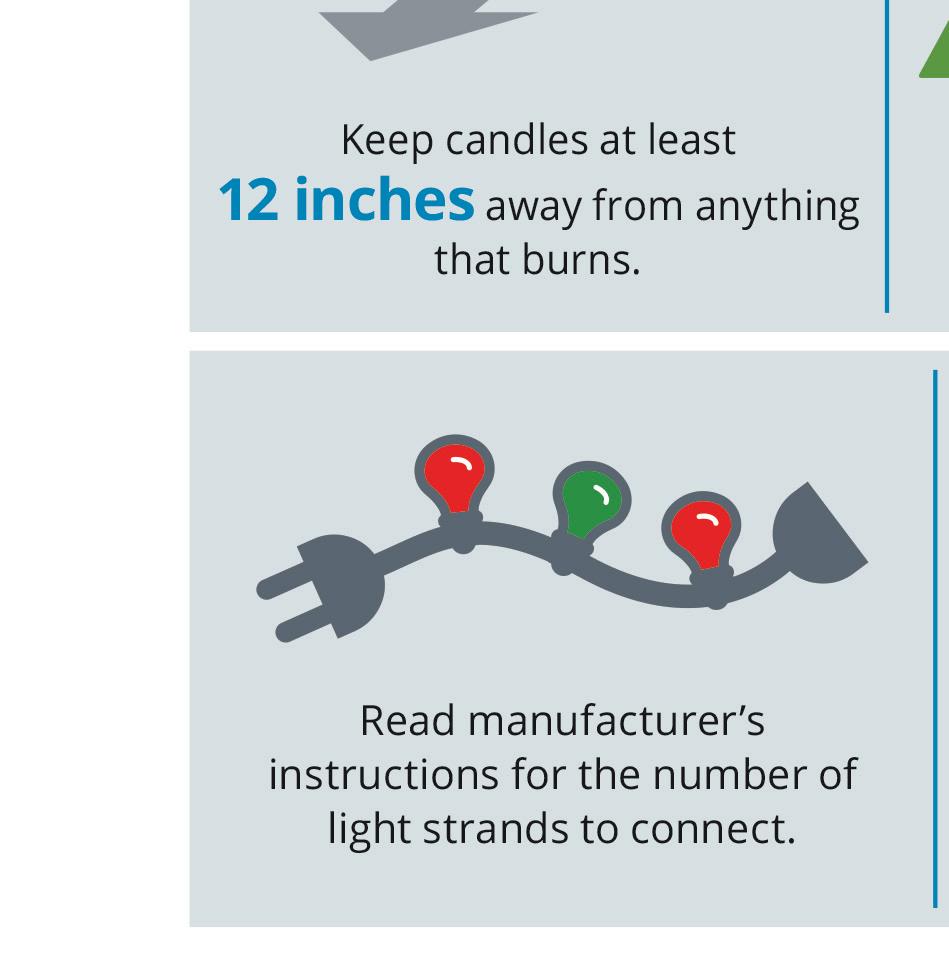

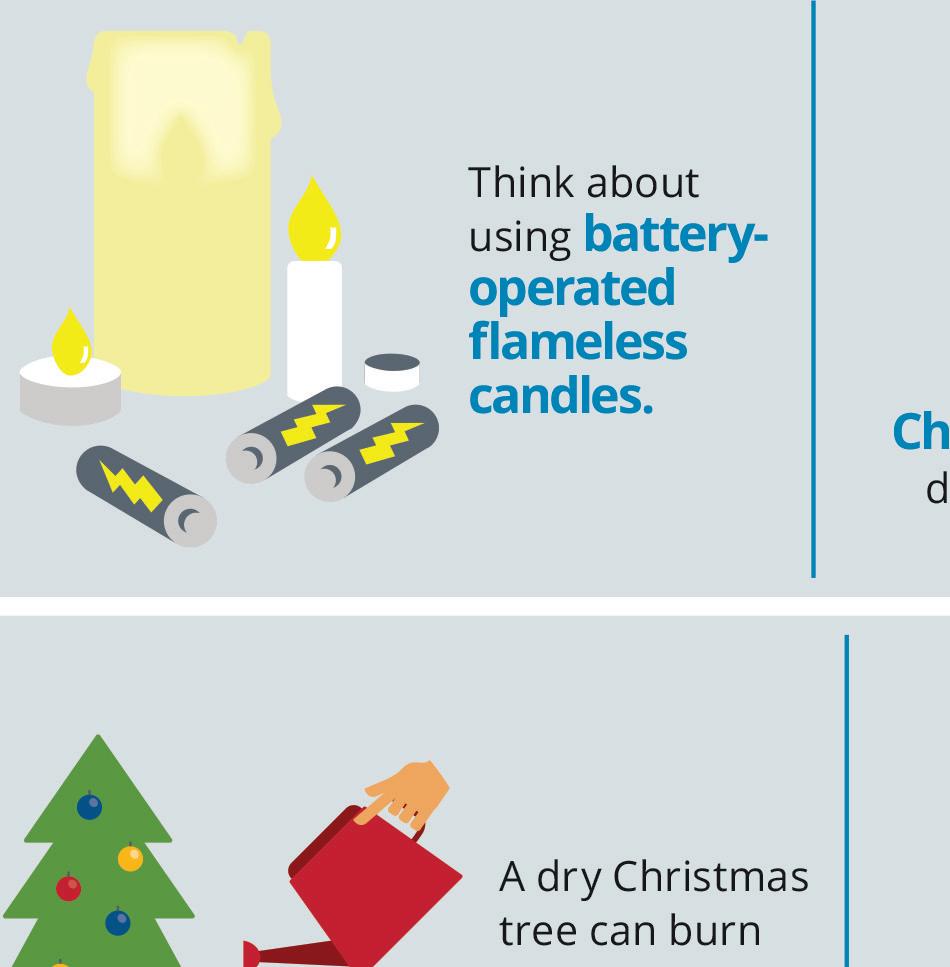
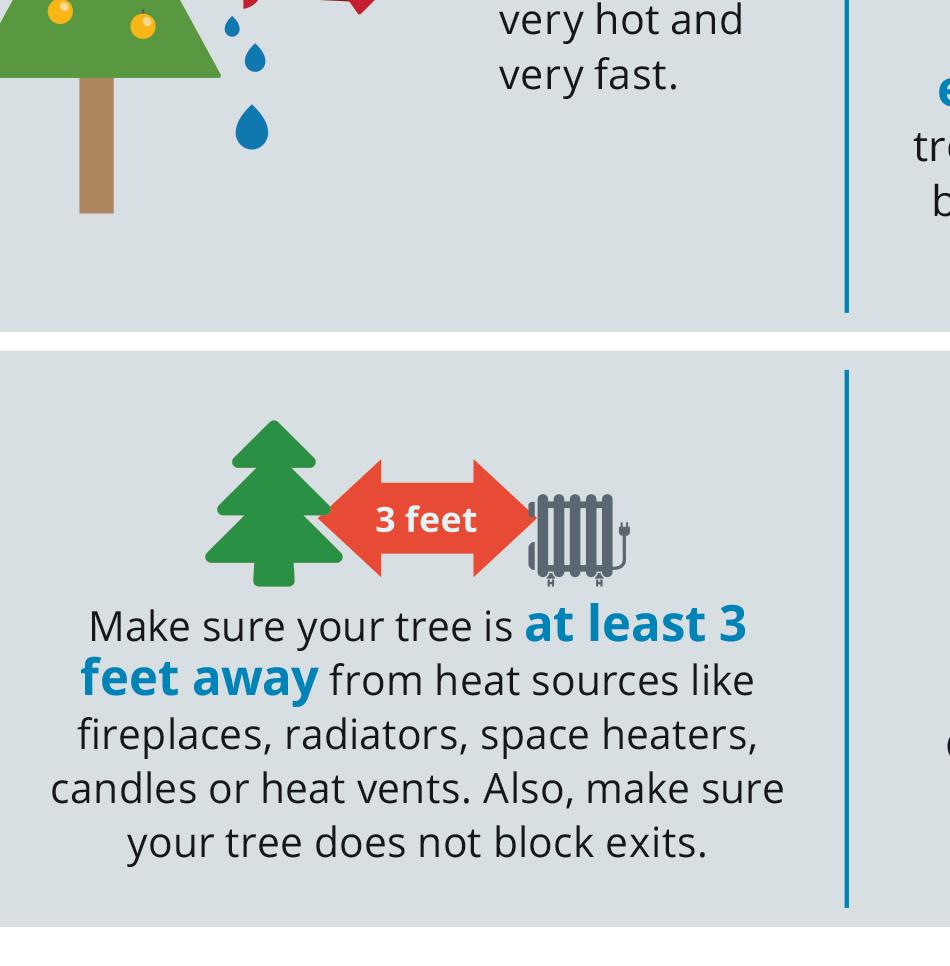

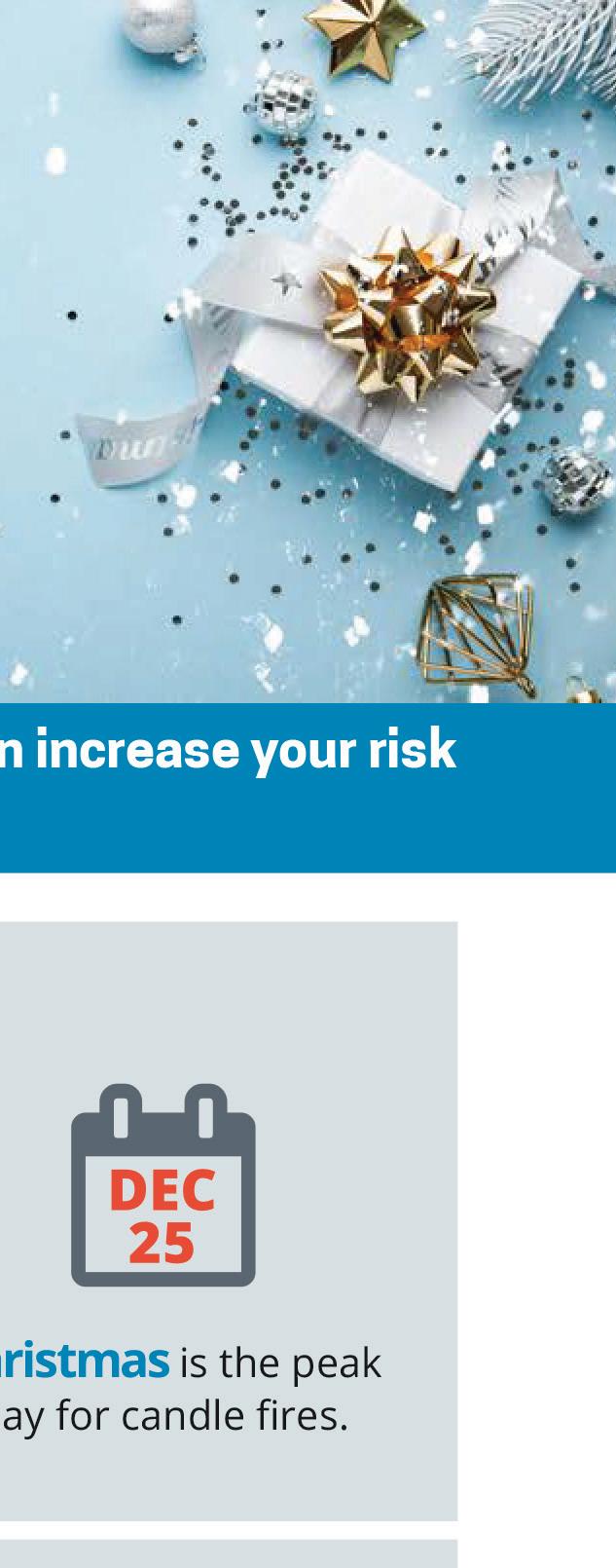
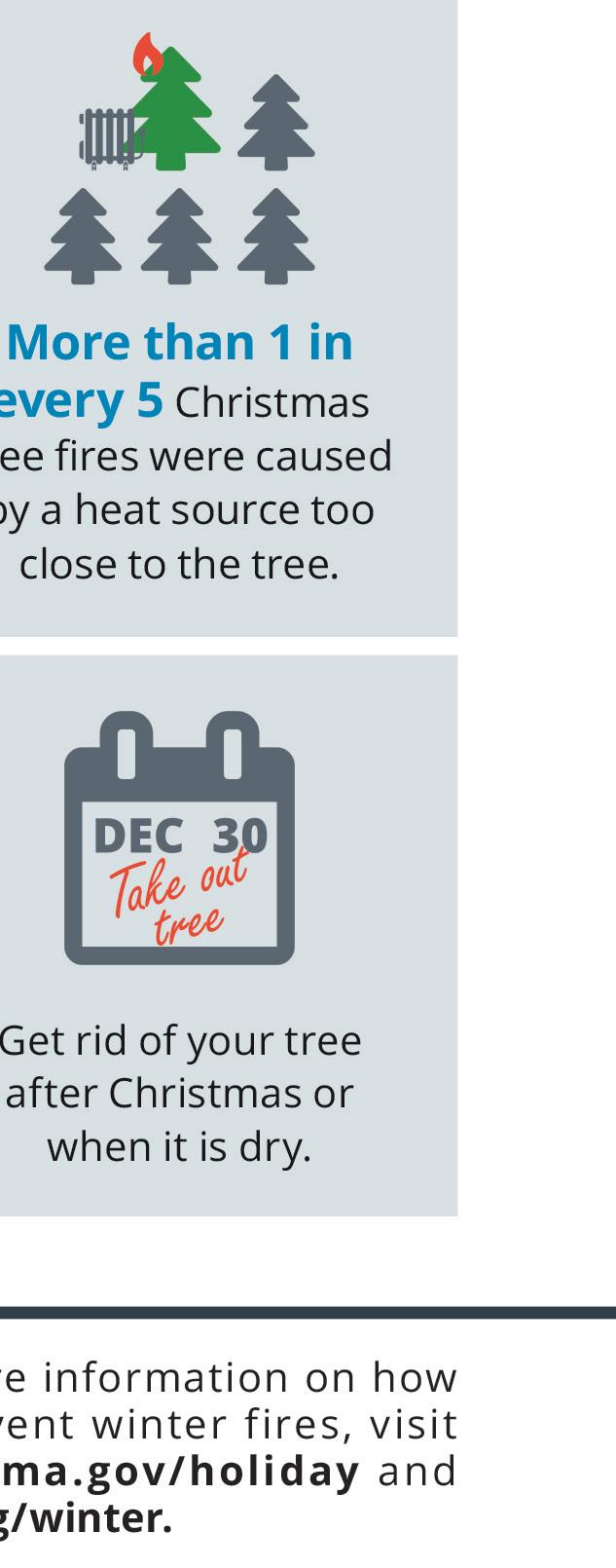
BY KATHY DIXON
Fall means it’s time for Medicareeligible Virginians to sign up or make changes to existing policies.
The Medicare Annual Election Period runs Oct. 15 through Dec. 7 and is when Medicare beneficiaries can purchase or change their Medicare Advantage plans or Part D prescription drug coverage for the coming year. Policy changes made during the Annual Election Period will go into effect Jan. 1.
The good news is that those enrolled in Part D prescription drug coverage will get some relief in 2025.
Under the Inflation Reduction Act of 2022, intended to expand benefits and lower drug costs, subscribers will see additional benefits starting in 2025.
The biggest change is that Part D enrollees will have a $2,000 out-ofpocket maximum, which is significantly lower than the previous threshold.
“This is huge,” said Tracy Cornatzer, director of sales for VAFB Health Insurance Solutions.
Another upcoming change is that the coverage gap—or “donut hole” as it’s sometimes called in the Medicare world—will be eliminated.
“The donut hole is being closed,” Cornatzer noted. “This will provide significant relief for some people.”
Medicare enrollees should have received their Plan Annual Notice of Change, or ANOC, by the end of last month. Cornatzer encourages Medicare beneficiaries to review that letter to find out how their plan will be impacted by changes under the Inflation Reduction Act.
Other benefits include a $35 cap on certain covered insulin prescriptions and no cost-share for recommended preventive vaccines with Medicare
Part D prescription drug coverage. Open enrollment begins Nov. 1
For those not eligible for Medicare and under the age of 65, open enrollment for individual and family health insurance plans under Virginia’s Insurance Marketplace begins Nov. 1. It’s been one year since a state-run health insurance marketplace was established through a new division within the Virginia State Corporation Commission. VAFB Health Insurance Solutions has helped members navigate the new enrollment platform, and Cornatzer said the transition has been relatively smooth.
If you have questions or need help enrolling in a health insurance plan, call your county Farm Bureau office or 800-229-7779. You may also visit vafb.com/health.

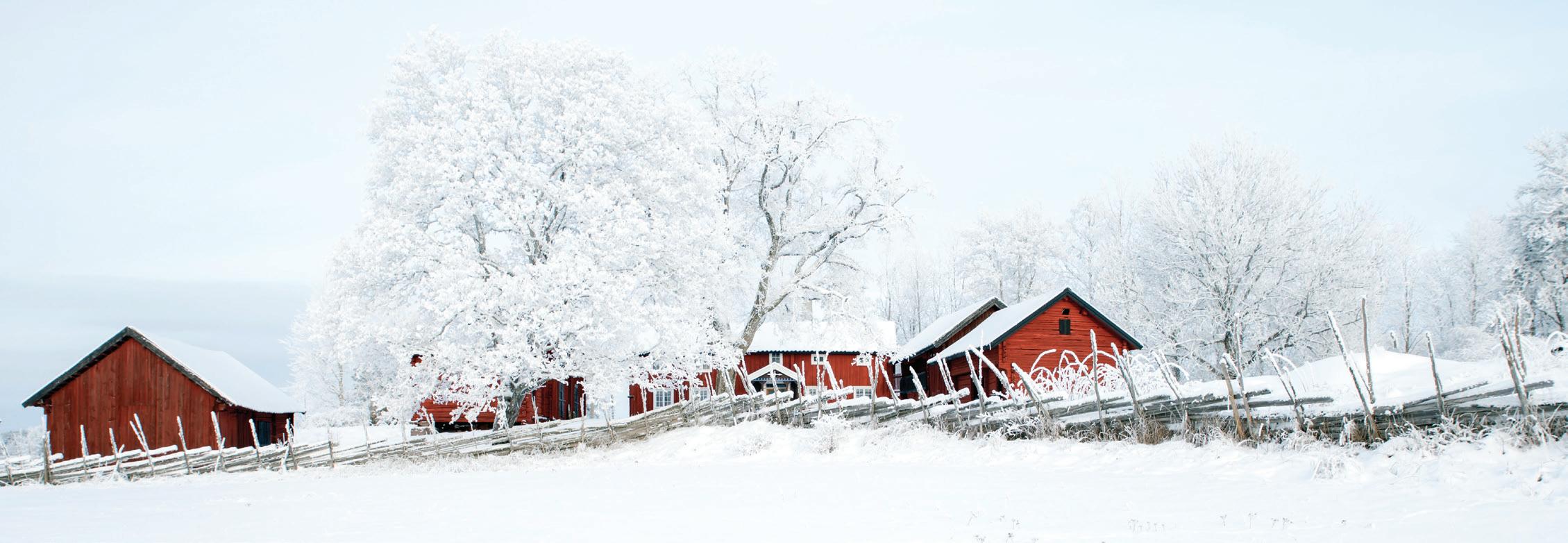
BY NICOLE ZEMA
La Niña’s effects on the weather means Virginians can expect a colder-than-average winter with more snow, according to the Farmers Almanac’s seasonal forecast.
Though extra snow has been predicted in recent years, it’s been a while since a hard winter heavily impacted Virginia’s farms.
Smyth County Farm Bureau agent Joel Pugh recalled “snow after snow” the winter of 2008.
“It would melt, followed by more snow and ice, and snow again, which built up on houses and barns,” he recalled. “It was unlike anything I had seen in my 25 years here.”
Winter weather conditions contribute to an uptick in collapse claims due to the weight of ice, snow and sleet on farm barns and structures.
“There always are concerns that this is ‘the year,’ but thankfully it hasn’t fully come to fruition the last couple of years based on predictions,” said Kim Price, farm and field underwriting manager for Virginia Farm Bureau Mutual Insurance Co.
Loss prevention measures
From a loss prevention standpoint regarding collapse, farmers should check interior framing and beams for structural integrity within barns and other farm buildings. Wood softness or rotting in trusses, beams and supports, or cracking and separation in those supports are signs of distress.
The structural condition of roofs also should be checked to ensure they can withstand a load of ice and snow. Any substantial bending in the roof line and ridge, or walls bowing or dipping, indicates a structural problem.
“If any signs are presented, it’s advisable to address the issue prior to requesting weight of ice, snow or sleet protection,” Price said.
She added that now is a good time to check your insurance policy and consult with your agent regarding any coverages that should be considered.
“While Southwest Virginia is especially prone to increased loss activity to farm structures due to collapse in winter months, obviously any other area of the state can experience those types of claims,” Price added.
Principle Property Coverages under the Farm Coverage Form (FO-6):
Coverage E protects farm-related buildings and structures, such as barns, silos, tenant-occupied dwellings, winery buildings and more on a named peril basis.
Coverage F provides coverage for scheduled farm personal property—owned, rented or borrowed machinery and equipment; farm products and supplies; and poultry and livestock on a named peril basis. Scheduled farm personal property is specifically listed on the declaration page, so it is easy to identify itemized properties covered by the form.
Coverage G is named peril coverage for unscheduled farm personal property. Unscheduled Farm Personal Property is reflected in the declaration page by a total limit that applies to farm personal property. It is most important that the farm personal property limit under Coverage G is listed for 100% of the value of the property due to loss settlement provisions.
Farmers should consult their agent about available coverage for barns and other farm structures, as well as their contents, for damages related to the weight of snow, ice or sleet.
“For livestock, coverage for extended perils including building collapse must be added to the policy with the Added Animal Perils endorsement,” Price said. This endorsement also offers protection for the death of livestock resulting from freezing, smothering in a snowstorm or ice storm, or falling through ice.
“Our county Farm Bureau agents are ready to discuss any of our coverage endorsements in a policy review,” she said. “This will establish what is available and most beneficial to the farmer based on their operation.”
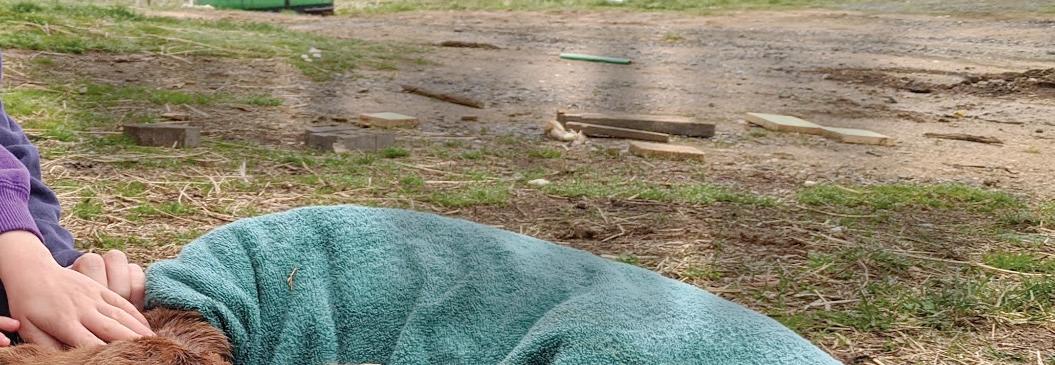
Farmers seek support in balancing motherhood and farming
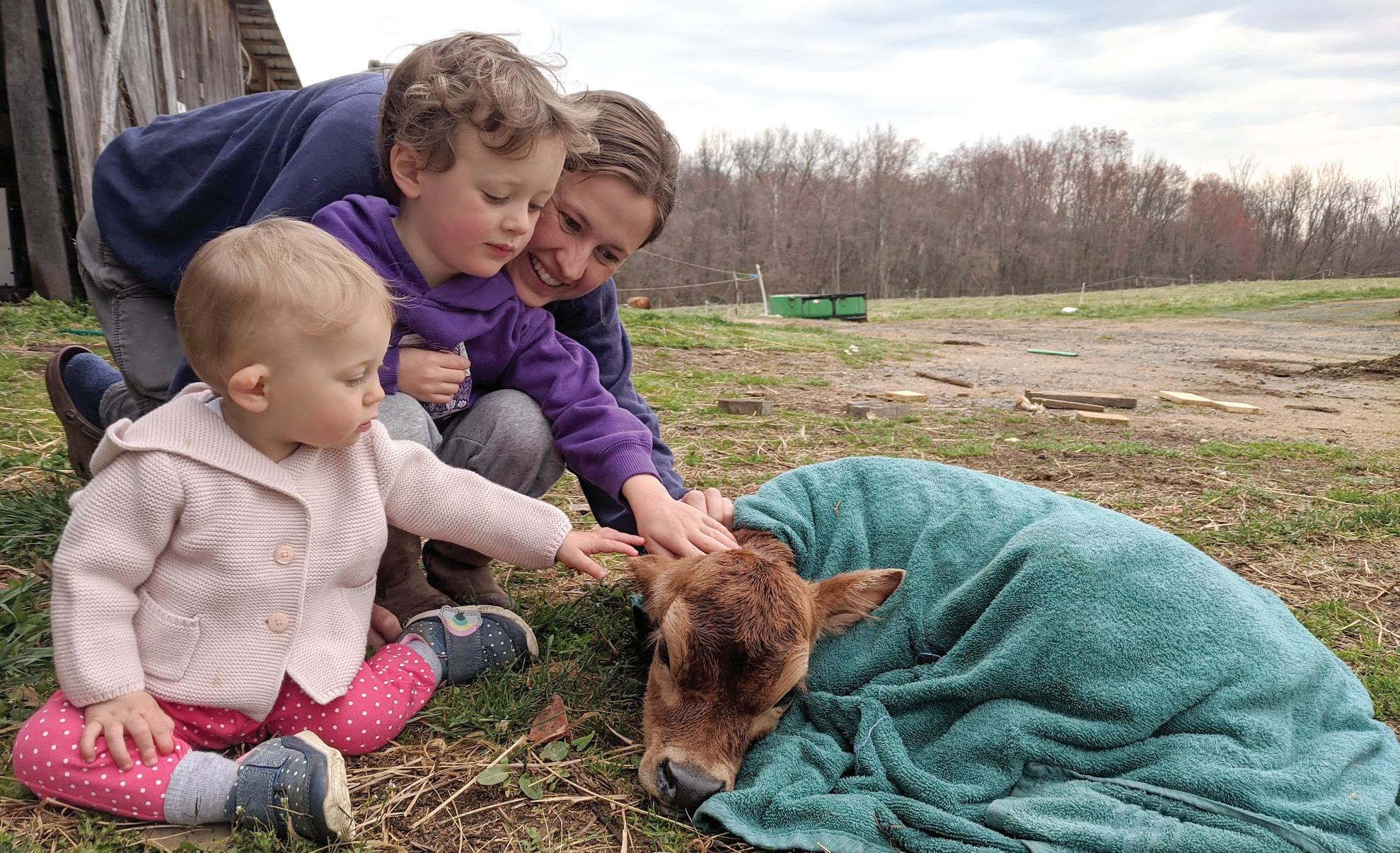
BY CHRISTINA AMANO DOLAN
Amother strolls through her fields on a serene, sunny day, harvesting the morning’s bounty with two free hands while her baby blissfully sleeps on her back. That was the dreamy, idealized vision of motherhood both first-generation farmer Pam Jones and third-generation farmer Mo Moutoux had before their respective firstborns arrived.
But farming with children looks more like “running a 100-meter sprint,” said Jones, who often races to finish the day’s bare essentials on her family’s Loudoun County farm before her 8-month-old baby beckons her inside.
Moutoux discovered the give-and-take of motherhood and farming while contending with myriad postpartum challenges.
“A lot of women think they’re going to strap their baby on their back and go about their day, but that just does not become a reality,” said Moutoux, who also farms in Loudoun County.
‘A juggling act’
For Jones, raising a 4-year-old son, infant daughter and a livestock and produce business is a constant “juggling act”—each having different needs at varying stages.
Baby wearing is not always practical—like when it’s too hot, too cold or time to move animals. Jones must consider her daughter’s comfort and safety.
When running farm errands with her toddler, fun incentives like popsicles or searching for toads by the pond are often necessary.
“Trying to constantly evolve how you’re approaching things and taking it day by day is essential,” Jones noted.
By the time their now 5-year-old daughter arrived, Moutoux and her husband had figured out how to keep their son entertained while running their produce and
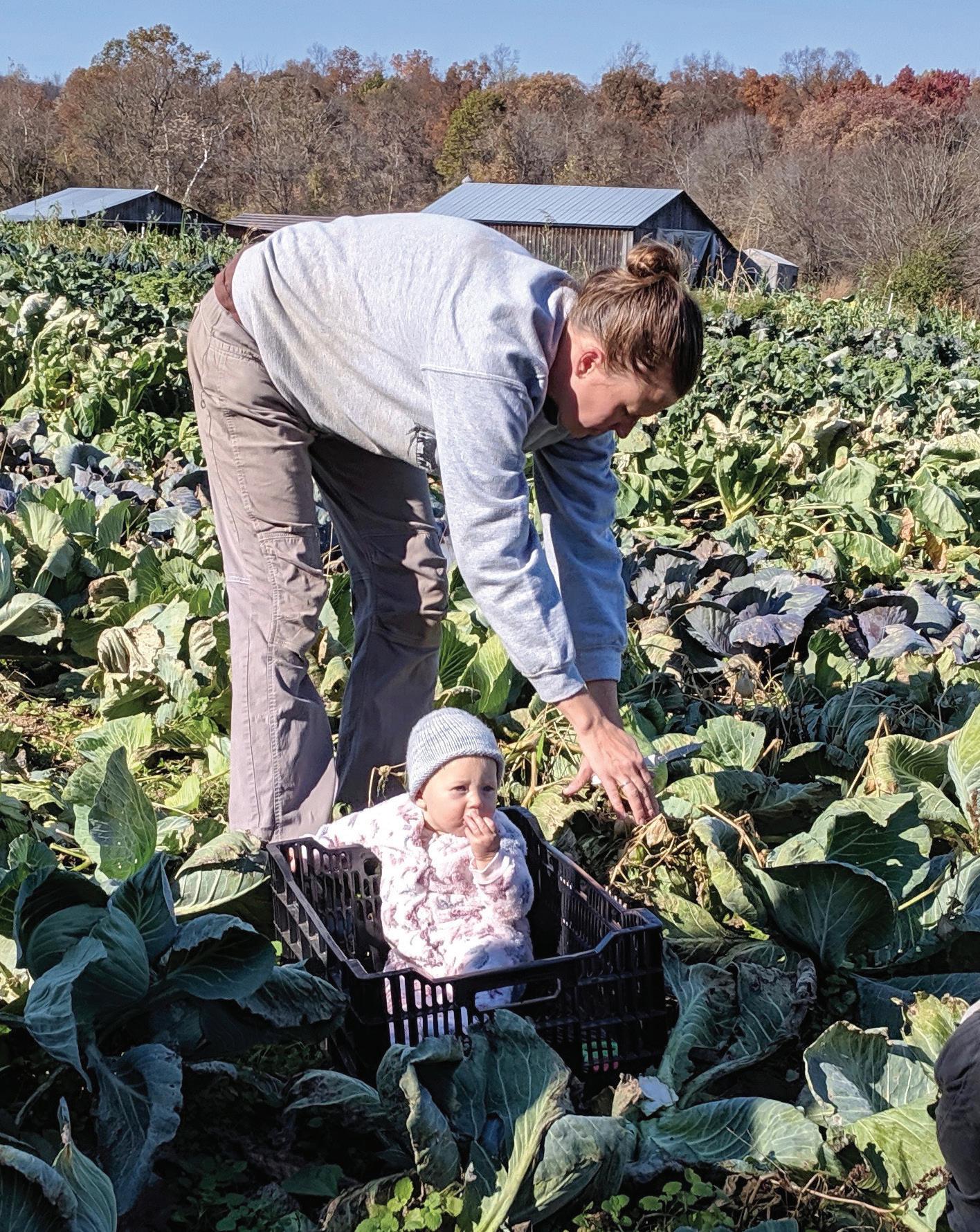
“ .. . sometimes we don’t want to reach out for help or admit that some days are really hard. But it’s okay to need help.”
livestock operation. They incorporated a rock pit, sandbox, swings and other play structures into their workspaces.
“Part of the reason we chose this life is because we want our kids around, so we figured out strategies,” Moutoux explained.
While she and Jones benefit from supportive partners and grandparents who share childcare responsibilities, an extra set of hands isn’t always available.
They face the same hurdles as countless mothers today. Living in Loudoun County, finding childcare that’s accessible, affordable and fit for flexible farming hours, “feels like walking a fine tight rope,” Jones remarked.
With nowhere to turn, area farming families banded together to create solutions.
Support is essential
With an abundance of small farms and limited summer camp options, the Moutouxes and other nearby farm families started an outdoor playgroup. Parents rotated childcare so everyone could focus on their farm tasks.
“It changed the game for a lot of us,” Moutoux said.
When Jones and her business partner, Sarah Obuchowicz, struggled to grow their produce operation while raising their newborns, they added a part-time nanny to the team.
“Know what your support network looks like before you need it, because you don’t want to burn out,” Jones advised. Moutoux, who also added a part-time nanny to her payroll, works to create a needed online space for fellow farming mothers to bond, share resources and offer mentorship.
The power of perspective
Balancing motherhood and farming can feel like “treading water,” Moutoux remarked.
“Mom guilt is real,” Jones concurred. “It’s wanting to be a very hands-on, present parent but at the same time, starting a farm is like having another baby.”
When feeling overwhelmed, she focuses on shifting her mindset—abandoning a to-do list mentality to slow down, cherish the present, and remember that nurturing the next generation is “the ultimate productivity.”
“Like a business, sometimes you’re in the trenches and you just have to grit your teeth, have some perspective and get through certain hard phases, and then you get to enjoy it on the other side,” Jones said.
The Joneses’ wonderment for farm life is often restored by their son, who reminds them to pause from work and appreciate the little things—like listening to the birds sing.
Moutoux’s family alleviates stressful days with spontaneous farm adventures—like a nighttime scavenger hunt for the “weirdest-looking” sweet potatoes.
“When I feel really stressed out, I try to keep it fun and light and recognize that we are giving them a really amazing life,” she said.
Moutoux offers a simple message to fellow farming mothers:
“You can’t do it all, and that’s okay. Tomorrow will be better.”
The AgriStress Helpline is available 24 hours a day, 7 days a week, and has interpretation services for 160 languages. Call or text 833-897-2474 to receive direct emotional support, advice and resources from a trained professional. Visit the AgriSafe website at agrisafe.org to learn more.
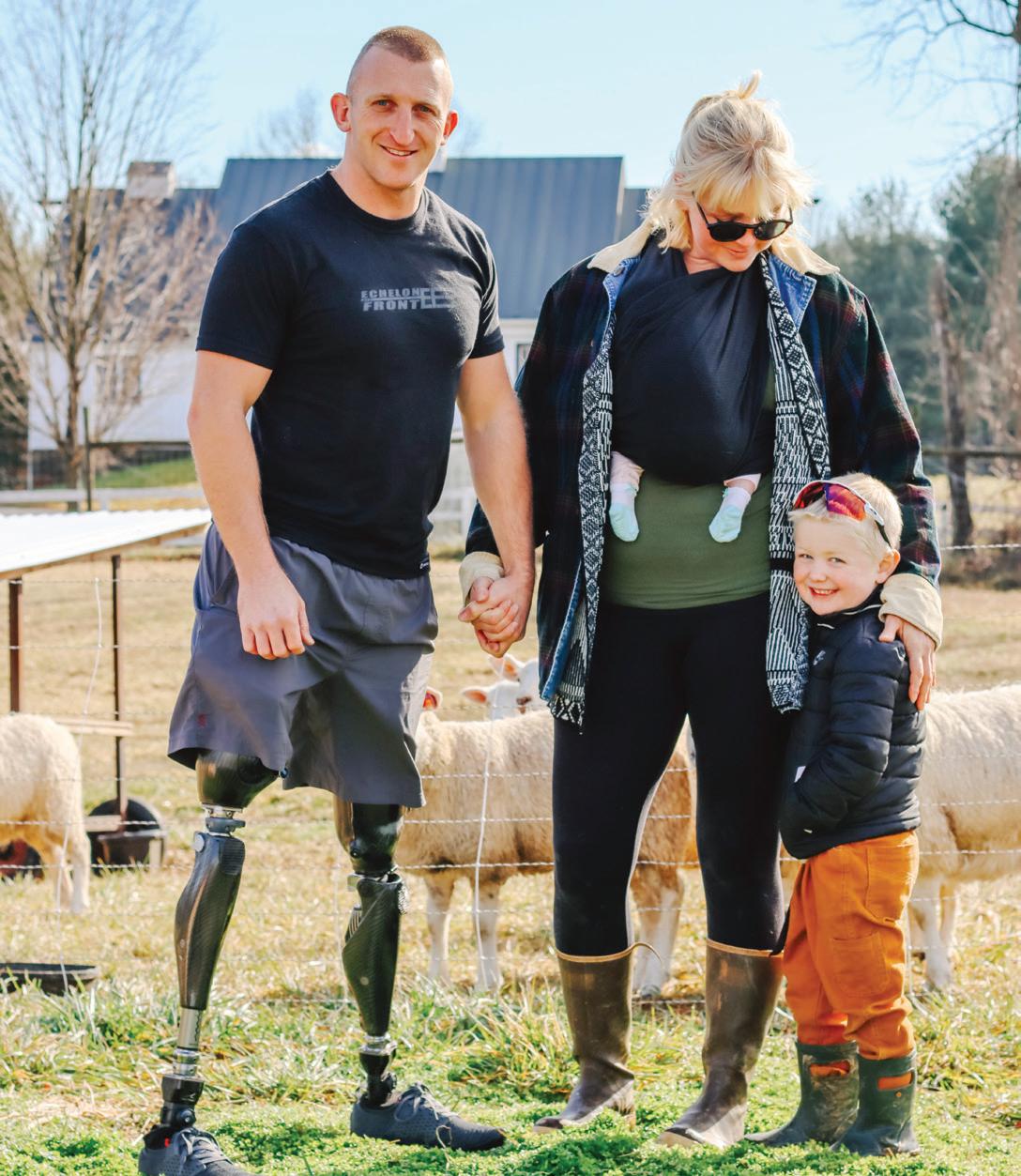
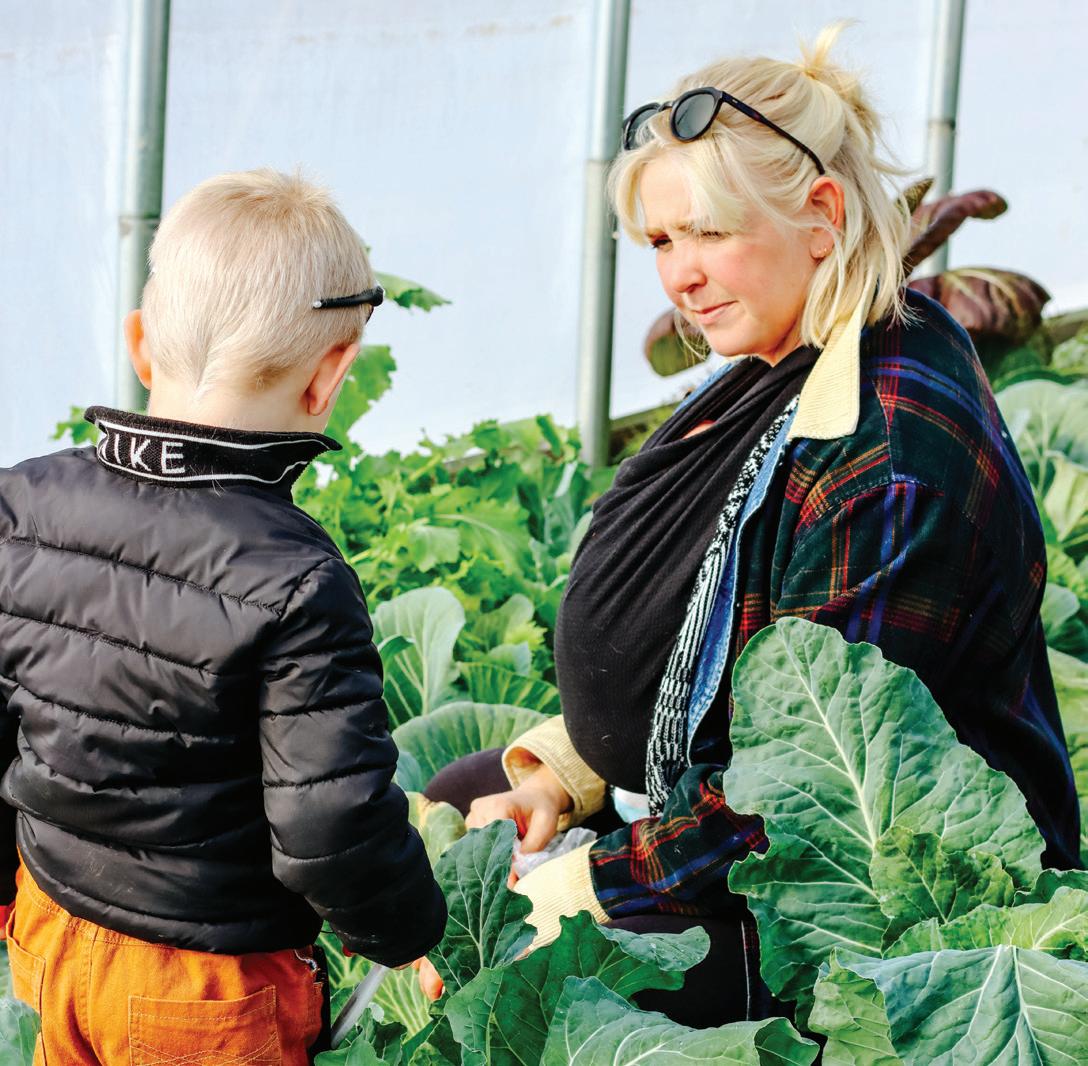


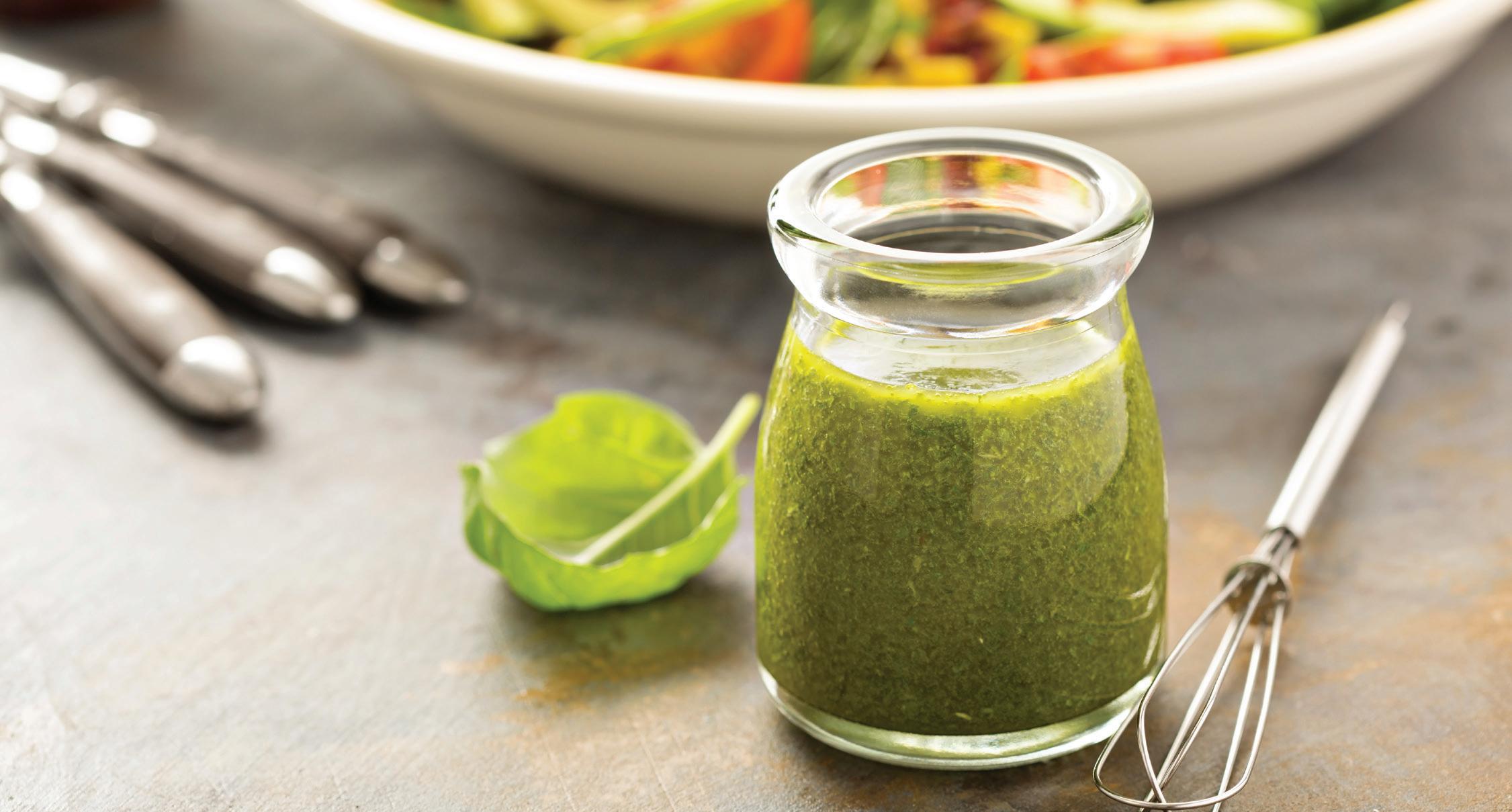
Vinegar varietals are gaining popularity for the versatility they bring to the table.
Whether it’s a bold red wine vinegar made from grapes grown in the Virginia countryside or a tangy apple cider vinegar created from local apples, vinegars offer a delicious way to enjoy a region’s flavors.
Infused with locally grown herbs like rosemary and thyme, or fruits like peaches and blackberries, vinegars offer distinctive flavors that can transform ordinary dishes into culinary experiences. They can be used countless ways: Tangy dressings, flavorful glazes, marinades and sauces, or even the zesty kick in a holiday cocktail.
Many Virginia artisans are producing their own small-batch vinegars, blending locally sourced ingredients to showcase seasonal herbs and produce and create one-of-a-kind flavors. Not just for inspiring cooking at home, these handcrafted vinegars also make thoughtful gifts for the holidays.


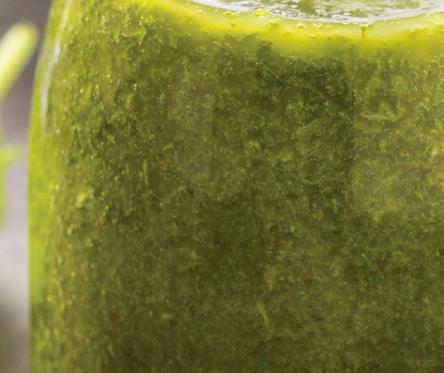
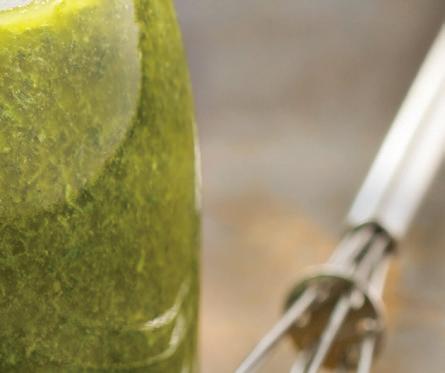


1 small garlic clove
1 cup packed basil leaves, coarsely chopped
¼ teaspoon chopped thyme and/or rosemary, optional
¼ cup extra-virgin olive oil
1½ tablespoons red wine vinegar
pinch of crushed red pepper
¼ teaspoon honey or pinch of sugar, optional
salt and freshly ground black pepper
DIRECTIONS
In a food processor, pulse the garlic until chopped. Add the basil and other herbs (if using), and pulse until finely chopped. Add the oil, vinegar, crushed red pepper, honey or sugar, and process until smooth. Season with salt and pepper.
—Recipe adapted from North Carolina Cooperative Extension
INGREDIENTS
4 cups torn greens, like kale, spinach, or Swiss chard
1 orange, peeled and sectioned
3 tablespoons chopped walnuts
2 tablespoons canola oil
2 tablespoons white wine vinegar
2 tablespoons finely chopped onion
1 tablespoon orange juice
1 teaspoon honey
¼ teaspoon ground black pepper
DIRECTIONS
Add the greens, orange and walnuts to a bowl, and toss to mix. In a separate bowl, whisk together the oil, vinegar, onion, juice and honey. Drizzle over the salad, and season with ground black pepper. Toss to combine.
—Recipe adapted from Virginia Cooperative Extension
INGREDIENTS
2 tablespoons chopped fresh thyme
1 tablespoon coarse-grind black pepper
3 cloves garlic, minced
beef top sirloin petite roast
FOR THE RELISH:
2 tablespoons butter
2 cups finely chopped onions
1 cup dried Mission and/or Calimyrna figs, chopped
¼ cup water
¼ cup white wine vinegar
DIRECTIONS
Heat oven to 325°.
In a mixing bowl, combine seasoning ingredients. Reserve 2 teaspoons for the relish, and press the seasoning evenly onto all surfaces of roast.
Place the roast fat-side up on rack in a shallow roasting pan. Insert an ovenproof meat thermometer so the tip is centered in the thickest part of the beef, not resting in fat. Do not add water or cover. Roast 1½-1¾ hours for medium rare, or 1¾-2¼ hours for medium.
Prepare the relish. In a large nonstick skillet, melt the butter over mediumlow heat, add onions and the reserved 2 teaspoons of seasoning. Cook 20-25 minutes or until onions are tender and lightly browned. Add the figs, water and vinegar, and bring to a simmer. Simmer 4-5 minutes or until the liquid has reduced and thickened. Remove from heat, season with salt as desired. Keep warm.
Remove the roast when the meat thermometer registers 135° for medium rare or 145° for medium. Transfer the roast to a carving board, tent it loosely with aluminum foil, and let it stand 10-15

minutes. The temperature will continue to rise about 10° to reach 145° for medium rare; 160° for medium.
Carve roast into slices, season with salt and pepper, as desired. Serve with relish.
—Recipe adapted from Beef. It’s What’s for Dinner.
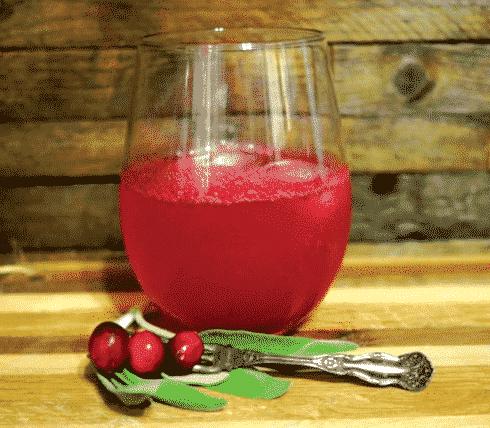
1 pound fresh cranberries
2 tablespoons water
1 cup cane sugar
1 cup unfiltered apple cider vinegar
2 fresh sage leaves
1 cup club soda
2 ice cubes
1 ounce vodka, optional
In a saucepan, cook the berries and water on medium-low heat until the berries pop and become soft, about 10 minutes. Place the cranberries in a quart jar, and add the sugar. Put a lid on the jar, and shake well until well combined, then let the cranberry and sugar mixture sit for 5 hours until it becomes a syrup.
Add the apple cider vinegar and sage leaves, then cover and shake. Let sit for 24 hours, shaking occasionally. Strain out the solids and pour the syrup into a clean jar. Store in the refrigerator.
Prepare a sage and cranberry shrub cocktail by mixing 2 ounces of syrup with a cup of club soda and two ice cubes. If using, add 1 ounce of vodka.
—Recipe adapted from The Vinegar Institute and De Nigris 1889.
While making your own flavored vinegar isn’t a complicated process, food-safe equipment is needed. Specific steps should be followed carefully to ensure bad bacteria doesn’t enter the process. To learn more about making flavored vinegars at home, visit the National Center for Home Food Preservation at bit.ly/4cXHWPJ
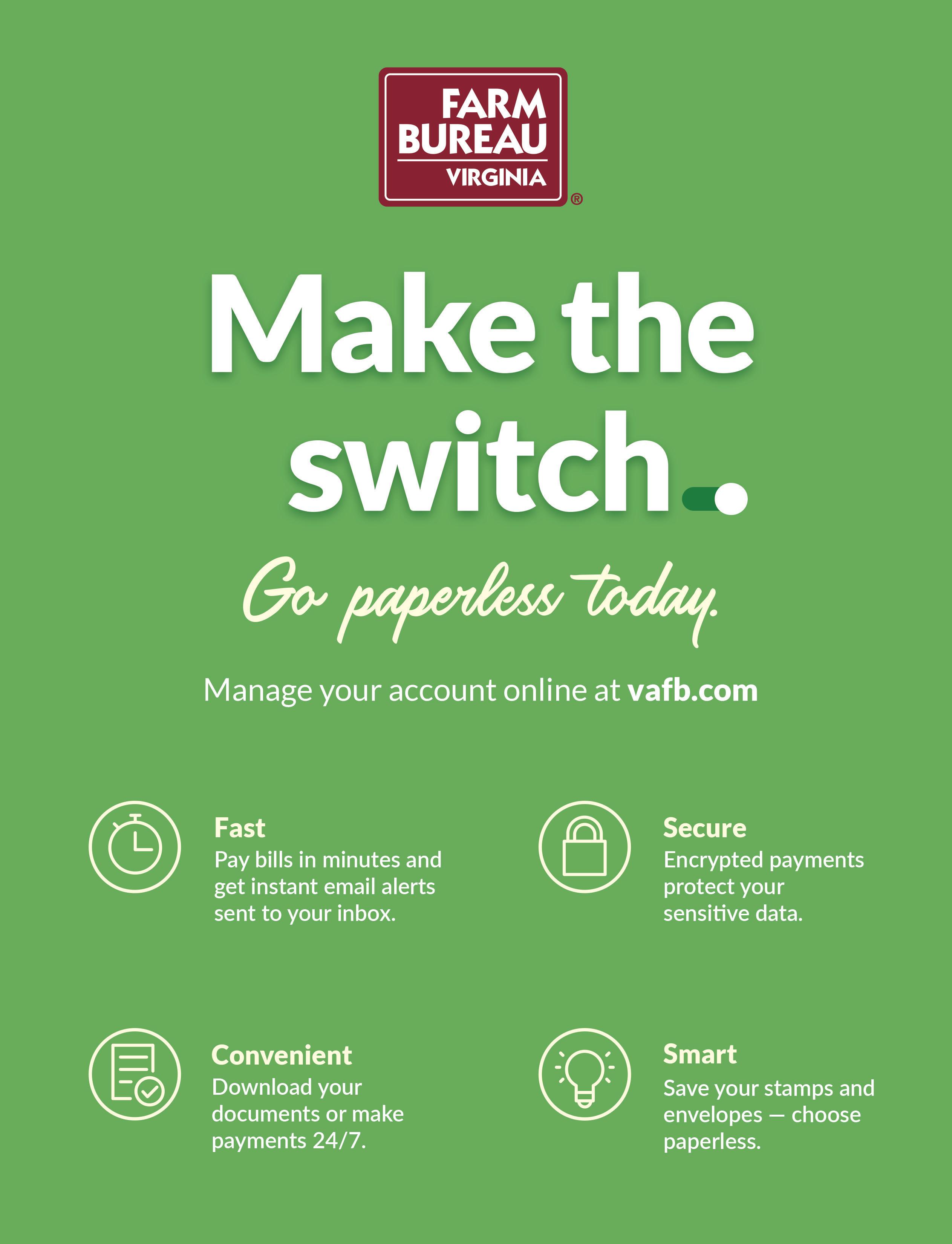
The annual meeting of Virginia Farm Bureau Mutual Insurance Company Policyholders will be held at 3:45 p.m., Wednesday, December 4, 2024, at The Omni Homestead Resort, 7696 Sam Snead Highway, Hot Springs, VA, 24445, for the following purposes:
1. To receive and act upon the reports of the Company officers.
2. To elect a Board of Directors, each to serve a term of on e year.
3. Other business as may properly come before the meeting or any adjournments thereof.
Dated this 1st day of October, 2024.
Kathleen M. Early, Secretary
